








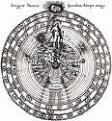





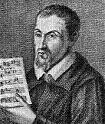


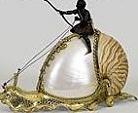
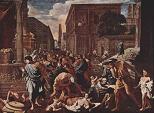
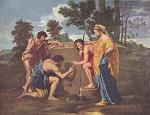
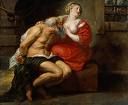
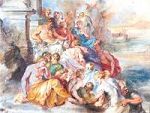
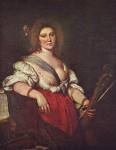
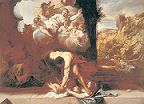

1630 There is a famine in India this year and next so bad that human flesh goes on the open market - farm-fed or roadkill? Between this year and 1795, the Dutch carry 477,782 slaves across the Atlantic to the New World; the total no. carried by all nations is around 10M? On Mar. 22 (Apr. 7?) 700-odd (400-odd?) Massachusetts Bay Colonists seeking to escape the Thirty Years' War and its economic slump sail in seven ships from Southampton, England for North Am.; Arabella carries John Winthrop (1588-1649) and the charter; en route John Winthrop delivers the sermon Model of Christian Charity, exhorting good Puritans to be like a "City Upon a Hill" and work to construct a Bible-thumping theocratic society in America that will "shame the faces of many of God's worthy servants", else face God's wrath, shaping American politics seemingly forever (until ?); after landing at Salem, Mass. on June 25, on Sept. 17 (Sat. Old Style) (Tues. New Style) they found the town of Boston (formerly Shawmut) (modern-day pop. 4.2M/4.6M) on the 800-acre Shawmut Peninsula surrounded by tidal marshes, deeply indented by coves, creeks and inlets, and dominated by three hills, with a narrow 1-mi.-long frequently-submerged neck joining it with the mainland; a few mo. earlier the town of Dorchester, Mass. near Boston (modern-day pop. 92K) is founded by English Puritan settler Israel Stoughton (1602-45) (remote ancestor of U.S. pres. FDR) et al. from Dorchester, Dorset, England; John Endicott (Endecott) (1588-1665) becomes gov. #1 of the Mass. Bay Colony, with capital at Charlestown, Mass. (originally Mishawum) on the Mystic River; the first law against gambling in Britsh North Am. is enacted; over the next few cents. the area is gradually filled in, increasing it to 1.8K acres; Medford, Mass. (originally Mistik) is founded as part of Charlestown; John Winthrop (gov. #1 of Mass. Bay Colony) begins keeping a Journal; on Nov. 9 the Boston-Charleston Ferry opens, starting at Noddle's Island, where English Anglican settler Samuel Maverick (1602-70) buys black slaves in 1638, becoming one of the earliest slave owners in Mass.; by the end of the year 17 more ships with another 1K colonists arrive, and by 1642 16K more follow; over 80K colonists leave England for greener pastures (New World, Ireland, Netherlands, Rhineland) in the Great Puritan Migration in this decade (1620-40), mostly Puritans fleeing Charles I for the Mass. Bay Colony, many of them as indentured servants; by 1640 20K settle in Mass. Bay Colony, and 55K total go to the New World, half settling in New England; the total pop. of the Am. colonies this year is only 4.6K; 35 mi. x 1 mi. Newtown (Newe Towne) (New City) is founded in Mass. on the N side of the Charles River opposite Boston 10 years after the Pilgrims land at Plymouth Rock; in 1638 it changes its name to Cambridge, Mass. (modern-day pop. 110K), becoming a univ. town.; it is later subdivided to form the additional towns of Newton (1691), Lexington (1713), Brighton (1837), and Arlington (1846). In June Swedish king Gustavus II Adolphus (1594-1632), the new protector of Protestantism invades N Germany and lands in Peenemunde in Pomerania with 4K men, then captures Stettin and the Neumark area in Brandenburg; on Aug. 13 at the Diet of Regensburg HRE Ferdinand II accedes to the demands and dismisses Wallenstein, and makes Johann Tserklaes (Tserclais) of Tilly, Duke of Bavaria (1559-1632) the new imperial cmdr., while Wallflower-stein retires to Gitschin; the speed of the Swedish blitzkrieg is later studied by Napoleon and Patton, and launches Sweden as a world power; too bad, the love of Swedish army officers for flashy fur hats causes the demand for North Am. fur to boom, dooming the Am. beaver? On July 8 the first Thanksgiving (Nov. 25, 1629?) is held in the Mass. Bay Colony. On July 26 Charles Emmanuel I the Great (b. 1562) dies of fever, and his son Victor Amadeus I (1587-1637) becomes duke of Savoy (until Oct. 7, 1637), ending the War of the Mantuan Succession and renewing his alliance with France, which is easy since his wife Marie Christine of France (1606-63) (sister of Louis XIII) is Henry IV's daughter. In Sept. Thomas Morton of Merry Mount (1579-1647), who with his men watched John Winthrop's ships land becomes the first criminal defendant in Mass. Bay for pub. a book lampooning the Puritans and painting a dream of a non-racist non-militarist land, and is expelled. On Nov. 10 the Day of Dupes sees Queen Mother Maria de' Medici publicly request her son Louis XIII to discharge Cardinal Richelieu in a stormy scene in Luxembourg Palace, after which the king retires to his hunting lodge in Versailles to think about it, allowing Richelieu to pull every string he's got to win the king to his side, causing him to send his mother into exile in Compiegne instead, and Richelieu to become virtual ruler of France. In Nov. 16K die in Venice of the plague, causing the 8-sided Church of Santa Maria della Salute to be built in 1631-87 to commemorate it, designed by Venice-born Baldassarre Longhena (1598-1682). The Treaty of Madrid, negotiated by painter Peter Paul Rubens ends the English-Spanish War. John Browne Sr. (1585-1662) arrives from Leyden, Holland in Plymouth, Mass. on the Mayflower (not the 1620 ship), and is appointed asst. gov. John Tradescant the Elder (1577-1638), builder of the Lambeth Ark in Lambeth, London on the S bank of the Thames River (the original cabinet of curiosity, filled with unusual objects gathered in his world travels), and known for his botanical garden in Lambeth becomes keeper of the king's gardens at Oatlands Palace in Surrey. The city of (The) Bronx, N.Y. (originally "The Bronck's Land") NE of the Harlem River on the Bronx River (modern-day pop. 1.4M) is settled by Swedish immigrant Jonas (Jonasson) (Jonassne) Bronck (Bronk) (Brunk) (1600-43), who builds the Emmanus farm. Capt. John Mason, who gives New Hampshire its name helps found the town of Portsmouth, N.H. By this year there are five patroonships in New Netherlands: two on the Hudson River, two on the Delaware River, and one on the Connecticut River; only Rennselaerwyck, founded by Killiaen van Rensselaer on the W bank of the Hudson around Ft. Orange (Albany) succeeds. Gov. William Bradford of Plymouth Colony secures the Bradford Patent from the Council for New England, confirming possession of the land and defining the boundaries more clearly; they never hold a charter. French royal physician Theophraste (Théophraste) Renaudot (1586-1653) (friend of Cardinal Richelieu, who converted him to Roman Catholicism) founds the Bureau d'Adresse et de Rencontre in Paris, a labor-exchange charity mating employers and employees. The Congregation of the English Ladies (Virgins) is founded in Munich. Mary Ward's uncloistered Society of English Sisters, known as the Jesuitesses is suppressed. Germany finally has a better idea? HRE Ferdinand II finally forbids the appropriation of the property of condemned heretics (witches), causing witchcraft prosecutions in Germany to plummet. Ponhea To dies, and Ponhea Chan becomes king of Cambodia (until 1642). Pangeran Ratu (-1651) becomes ruler of Banten in NW Java, center of the pepper trade, and becomes the first ruler on Java to take the title of sultan, under the name Abulmafakhir Mahmud Abdulkadir, causing Sultan Agung of Mataram to soon follow suit. The first buccaneers (internat. pirates) begin settling in Tortuga off the NW coast of Hispaniola in this decade - they screw their buccaneers off at every port? White Va. settler Hugh Davis is ordered by a court "to be soundly whipt... for abusing himself... by defiling his body in lying with a Negro". Anthony van Dyck becomes court painter to Archduchess Isabella in Antwerp (until 1632), pumping out gobs of cool portraits with that Italian Renaissance savvy. The first public advertising is done in Paris - I got the notion to rock the boat? In this decade soldier-students become common in Germany - row, row, row your boat, gently down the street? In this decade the Great Tew Circle of English lit. figures and clerics meets at the manor house of Great Tew, Oxfordshire and in London, led by Lucius Cary, 2nd Viscount Falkland (1610-43), incl. Edward Hyde, 1st Earl of Clarendon. In this decade the Fijnschilder (Dutch "fine painter") School in Leiden, known for meticulous genre and trompe l'oeil paintings is founded by Gerrit Dou (Gerard Douw or Dow) (1613-75) (ends 1710). Peter Paul Rubens marries 16-y.-o. Helena Fourment; they go on to have five children. The High Baroque Period of art begins in Italy (ends 1680). Kikkoman's soy sauce co. is founded by the widow of a samurai named Mogi in Japan. Architecture: Inigo Jones is commissioned by Francis Russell, 4th Earl of Bedford to design Covent Garden Square in Westminster, London, becoming the first large public square in London, attracting new bldgs., becoming a model for future growth in the West End. Inventions: The Ducking (Cucking) Stool is introduced for punishing quarrelsome women in New England in this decade?; the laws stay on the books until 1967? Richard Delamain (1600-44) of England invents the Circular Slide Rule. English poet Sir John Suckling (1609-42) invents the card game of "Brief Lives", AKA Cribbage, is knighted at age 21, and becomes a leader in the court of Charles I as a cavalier to the king. Mate (Maté) Szepsy Laczko of Hungary invents the method for producing sweet Tokaj (Tokay) wine from botrytised furment grapes (infected with botrytis cinera). The modern violin ("new violin") is first used in Italy about this time. English physician-astrologer Robert Fludd (1574-1637) pub. the first Color Wheel, taking Aristotle's color line and turning it on itself to create seven areas. Science: Jesuit astronomer Niccolo Zucchi (-1670) discovers the spots on Jupiter's surface on May 17 - I have this uncle with a great big face and a big red mustache? Music: Gregorio Allegri (1582-1652), Miserere Mei, Deus (Have Mercy on Me, God); set to Psalm 51/50; composed for Pope Urban VIII to use in the Sistine Chapel during Wed.-Fri. Holy Week matins; writing it down or performing it elsewhere is made punishable by excommunication; incl. Pt. 1: Tallis Scholars, Pt. 2. Girolamo Frescobaldi (1583-1643), Arie Musicale. Art: Jacques Callot (1592-1635), The Temptation of St. Anthony (print). Anthony van Dyck (1599-1641), Maria Louisa de Tassis; Philippe Le Roy; Frans Hals (1580-1666), Daniel van Aken Playing the Violin; La Bohemienne. Laurent de La Hyre (1606-56), Pope Nicholas V Opening the Crypt of St. Francis of Assisi; painted for the Capuchin friars of the Marais. Jacob Jordaens (1593-1678), The Infant Jupiter Fed by the Goat Amalthea. Nicolas Poussin (1594-1665), Martyrdom of St. Erasmus; Rinaldo and Armida; The Plague at Ashdod; Tancred and Erminia (1630-5); Les Bergers d'Arcadie (1630-9). Jusepe de Ribera (1591-1652), Archimedes; The Martyrdom of St. Bartholomew. Jeremias Ritter (1582-1646), Nautilus Snail (sculpture). Sir Peter Paul Rubens (1577-1640), Apotheosis of James I (Whitehall banquet hall); Cimon and Pero; King Minos Judging the Dead (drawing). Bernardo Strozzi (1581-1644), The Violin da Gamba Player (1630-40). Pietro Testa (1611-50), The Massacre of the Innocents (1630-40). Diego Velazquez (1599-1660), Vulcan's Blacksmith Shop. Nonfiction: The first trans. of the Christian Greek Scriptures into vernacular Greek is prepared by Maximus Callipolites, Greek monk of Callipolis, under the auspices of Cyril Lucaris (1572-1638), ecumenical patriarch of Constantinople. John Amos Comenius (1592-1670) and Samuel Hartlib (1600-62), Pansophiae Prodromus (London); universal education, to be taught at his Pansophic College; followed by "Pansophiae diatyposis". Sir John Hayward (1560-1627), The Life and Raigne of King Edward VI (posth.). Rev. Francis Higginson (1588-1630), New England's Plantation, or A Short and True Description; living conditions in Am. Jean Rey (1583-1645), Essays on the Cause of the Increase in Weight of Tin and Lead when they Calcinate; French physician attributes the increase in weight of tin and led when they are heated to the weight of air, leading to the invention of the barometer. John Smith (1580-1631), The True Travels, Adventures, and Observations of Captaine John Smith. Plays: Pierre Corneille (1606-84), Clitandre au L'Innocence D'livree (tragicomedy). Thomas Middleton (1580-1627), A Chaste Mayde in Cheapside (comedy). Tirso de Molina (1584-1648), El Burlador de Sevilla y Convidado de Piedra (The Seducer of Seville); Don Juan is first given a literary personality, although he was already an old myth of libertinism from the medieval past? - the original Mister Johnson? Poetry: Andres Christensen Arrabo, Hexaemeron (religious poem); initiates modern Danish lit. Births: English "The Compleat Gamester" writer-poet Charles Cotton (d. 1687) on Apr. 28 in Beresford Hall, Alstonefield, Staffordshire. English-Scottish 6'2" dark-complected king (1660-85) Charles II (d. 1685) on May 29 in St. James's Palace, London; 2nd (eldest surviving) son of Charles I and Henrietta Maria; prince of Wales from birth, styled "prince of Great Britain", with Scottish title included; born the first day that the Cassiopeia A supernova became visible? English actress Margaret "Peg" Hughes (Hewes) (d. 1685) on May 29; first English prof. stage actress (1660); mistress of Prince Rupert of the Rhine. German-Austrian banker-diplomat (Ashkenazi Jew) ("the Judenkaiser") Samuel Oppenheimer (d. 1703) on June 21 in Heidelberg; stepfather of Joseph Suss Oppenheimer (1698-1738); father of Simon Wolf Oppenheimer (-1726) and Jakob Wolf Oppenheimer; ancestor of Felix Mendelssohn. German Mannerist painter ("the Silesian Rembrandt") Michael Leopold Lukas Willmann (d. 1706) on Sept. 27 in Konigsberg, Prussia. German electress Sophia of Hanover, Countess Palatine of Simmern (d. 1714) on Oct. 14 in The Hague; youngest of five daughters of "Winter King" Frederick V (1596-1632) and "Winter Queen" Elizabeth Stuart (1596-1662) (daughter of James I of England); mother of George I of England (1660-1727), who founds the Hanoverian Dynasty in England; 1st cousin of Charles II of England. English mathematician Isaac Barrow (d. 1677) in Oct. in London; educated at Gresham College, and Trinity College, Cambridge U. English mistress (of Charles II) Lucy Walter (d. 1658) in Roch Castle near Haverfordwest, Wales; mother of James Scott, 1st Duke of Monmouth (1649-85). Russian Cossack leader Stepan Timofeyevich "Stenka" Razin (d. 1671). English horticulturist Robert Sharrock (d. 1684). German architect Wolf Caspar von Klengel (d. 1691). English theologian and Hebrew scholar John Spencer (d. 1693). French scientist Jean Richer (d. 1696). English mercantilist politician (gov. of the East India Co., 1677-) Sir Josiah Child, 1st Baronet (d. 1699). Danish sculptor Caius Gabriel Cibber (d. 1700) in Schleswig, Denmark; emigrates to England; father of Colley Cibber (1671-1757). Swedish scientist Olof (Olaus) Rudbeck the Elder (d. 1702); father of Olof Rudbeck the Younger (1660-1740). French financier Louis de Bechamel (Béchameil), Marquis de Nointel (d. 1703); chief steward of Louis XIV's household; namesake of Bechamel Sauce. Deaths: English soldier Sir William Stanley (b. 1548) on Mar. 3 in Ghent. French Huguenot poet-gen. Theodore Agrippa d'Aubigne (b. 1552) on Apr. 29 in Geneva. English astrologer-theologian Richard Havey (b. 1560). Italian duke of Savoy (1580-1630) Charles Emmanuel I the Great (b. 1562) on July 26 in Savigliano (fever). English traveler Fynes Moryson (b. 1566) on Feb. 12. German astronomer Johannes Kepler (b. 1571) on Nov. 15 in Regensburg: "Nature uses as little as possible of anything"; "Discover the force of the heavens O men: Once recognized it can be put to use"; "I used to measure the Heavens, now I measure the shadows of Earth. Although my mind was heaven-bound, the shadow of my body lies here"; "Truth is the daughter of time, and I feel no shame in being her midwife"; "I much prefer the sharpest criticism of a single intelligent man to the thoughtless approval of the masses"; "There is a force in the earth which causes the moon to move." English courtier William Herbert, 3rd earl of Pembroke (b. 1580) on Apr. 10 (cirrhosis of the liver?) (syphilis?). German composer Johann Hermann Schein (b. 1586) on Nov. 19 in Leipzig. Dutch explorer Jan Pieters Coen (b. 1587). Dutch artist Esaias van de Velde (b. 1587) on Nov. 18 in The Hague.
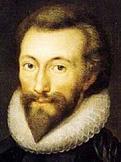








1631 In Jan. desiring an alliance with Sweden to counter the Hapsburgs, shatter the Spanish hegemony over the Netherlands, and establish French supremacy in Europe, despite crossing the Roman Catholic-Protestant battle lines, Cardinal Richelieu signs the 5-year Treaty of Barwalde with Sweden, furnishing the latter with money to fight the Thirty Years' War while committing no troops. On Feb. 5 Roger Williams and his wife arrive in Boston from England, and hold a brief pastorate in Salem before moving to Plymouth. In Feb. antsy elector Johann Georg I of Saxony calls a meeting of Protestant princes in Leipzig, where preacher Matthias Hoe von Hohenegg (1580-1645) tries to talk him into breaking his alliance with HRE Ferdinand II, but only gets him to lodge a formal protest - which is like laying an egg? While the crowd oohs and aahs? On Mar. 20 after the Catholic League under CIC Flemish field marshal Count Johann Tserklaes Tilly, along with Pappenheim destroys the Swedish garrison in Neu Brandenburg, they siege the Protestant town of Magdeburg on the Elbe River (which promised to support Sweden) for 2 mo. with 40K men, then after fence-sitter Johann Georg I of Saxony refuses to allow Gustavus II Adolphus to cross the Elbe River at Wittenberg to relieve it, Tilly captures it on May 20, and massacres 25K of its 30K inhabitants, gruesomely torturing them to boot and burning the city, then burns Halls and invades Saxony, ravaging the countryside and finally causing Johann Georg I to see the light; never fear, Protestant champion Adolphus II Gustavus of Sweden and his 16K-man army sacks Frankfurt-on-Oder, repulses a 23K-man imperial army under Count Tilly on Aug. 1 (July 22 Old Style) at the Battle of Werben in Germany, then on Sept. 15-17 (Sept. 5-7 Old Style) after concluding an alliance with Johann Georg I defeats Silly Tilly at the "world-changing" First Battle of Breitenfeld in Saxony N of Leipzig (23.5K Swedish and 18K Saxon Protestant troops vs. 31.3K Catholic troops) (the Saxon troops turn tail and flee at the start of the battle, making the Protestant V all the more cool), becoming the first major Protestant V of the Thirty Years' War and making Gustavus the master of Germany, gaining him the title of Gustavus the Great, all causing freaked-out HRE Ferdinand II to reappoint Wallenstein as CIC in place of Tilly; Magedeburg becomes a permanent symbol of the horrors of war, unmatchable until WWI? On Mar. 31 English poet-divine John Donne (b. 1572) dies; in seeming tribute about bells tolling for thee, there is an earthquake in Naples, and on Dec. 16 Mt. Vesuvius has its biggest eruption in a thousand years, killing 3.5K, causing the word "lava" (Lat. "labi" = to slide) to come into use. On May 14 Mervyn Audley (Tuchet), 2nd Earl of Castlehaven (1593-1631) (AKA Lord Audley) is beheaded on Tower Hill in London for sodomy (oddly touchit?) with his page Laurence (Florence?) FitzPatrick, who confessed and was also executed, and also for assisting Giles Browning (Broadway) in raping Anne Stanley, countess of Castlehaven, during which Lord Castlehaven allegedly held held down; the whole thing is a frame-up by his son James Tuchet (1614-84), who feared being disinherited, with the countess in on it with him? On May 30 Cardinal Richelieu of France and Maximilian I of Bavaria sign the secret Treaty of Fontainebleu, whereby Maximilian promises not to attack the enemies of France; Maria de' Medici is exiled to Brussels, and joins forces with her son Duke Gaston of Orleans against Richelieu. On May 30 La Gazette, France's first weekly newspaper is founded in Paris by French physician-journalist Theophraste (Théophraste) Renaudot (1586-1653); in 1762 it becomes Gazette de France; discontinued in 1915. On June 17 Arjumand Shah Begum (b. 1593) (AKA Mumtaz Mahal, or Jewel of the Palace), 2nd wife of Indian Mughal emperor #5 (1628-58) Shah Jahan dies in childbirth after bearing him 14 children; he dedicates the drop-dead-gorgeous Mughal-style ivory-white marble domed 32M rupee Taj Mahal (Pers. "best of buildings", "crown of the palace") mausoleum on the S bank of the of the Yamuna River in Agra, Uttar Pradesh (built in 1632-53) to her memory; the project employs 20K artisans under the guidance of a board of architects led by royal architect Ustad Ahmad Lahauri. On June 19 the Treaty of Cherasco, negotiated by Cardinal Mazarin gives Victor Amadeus I of Savoy part of the duchy of Montferrat (between Piedmont, Milan and Genoa), but he is forced to surrender the important fortress of Pinerolo et al. to France. On June 20 Dutch-born Muslim Barbary pirate (Sale Rover) Murad (Murat) Reis (Jan Janszoon van Haarelem) (1570-1641) sacks Baltimore, County Cork, Ireland in Roaring Water Bay in West Cork, taking 108 slaves back to North Africa after spitting out the Gaels and keeping only the English, becoming the largest attack by Barbary pirates on Ireland or Great Britain. In Oct. learned (but annoying?) MP William Noy (1577-1634) is appointed British atty. gen., going on to impose "ship monies" from the areas around ports to get his boss Charles I some money without going through Parliament; his enemies end up rejoicing at his agonizing death in 1634 from kidney stones? On Oct. 10 after regrouping and marching into Bohemia, the Saxons under Johann Georg I capture Prague, despoiling the Infant Jesus of Prague statue (1555), after which they decide to negotiate peace terms and allow Wallenstein to drive them back to Saxony. The Gen. Court of Mass., which elects the gov. and his assistants (incl. deputy gov.), and is composed of shareholding "freemen", expands its membership from John Withrop and his assistants to 118 more settlers, but stipulates that only church members can be accepted. The Housewives of Lowenburg stand up to the Roman Catholic priests trying to convert them out of Protestantism. Baron Nuesch saves Rothenberg from sacking by Count Tilly by meeting his challenge to quaff a 3.5 liter vessel of wine. Father Ruiz de Montoya helps 12K Indians escape from Paulistas (slave raiders from Sao Paulo) by descending the Parana River. English Roman Catholic George Calvert, 1st Baron Baltimore (1579-1632) petitions for a charter for Maryland (Md.) from Charles I, while London merchants and William Claiborne from Jamestown Colony try to stop it; meanwhile Claiborne has own little project, Kent Island in Md., which just happens to fall within the land later granted to Calvert - bring on the baksheesh? Pope Clement VIII recognizes the independence of the tiny Italian repub. of San Marino (founded 301), protected by the Montefeltro Family of Urbino. After being caught conspiring against the French throne, Duke Charles of Guise (-1640) goes into voluntary exile in Italy; when he dies his wife Henriette-Catherine de Joyeuse isn't allowed to return to France until she sells Couiza (home of Rennes-le-Chateau) and Arques to the crown. The Franco-Moroccan Treaty of 1631 is negotiated by French Adm. Isaac de Razilly and Barbary pirate Murad Reis in Sale, Morocco, granting a consulate and freedom of religion for French subjects in Morocco. The first printing house is established in Tartu, Estonia. The Dutch West India Co. founds a whaling station at Cape Henlopen, on the point of land separating the Atlantic from Delaware Bay on the Delaware River. English Capt. Thomas James explores James Bay in Canada. The English settle St. Kitts (Leeward Islands). Duxbury, Mass. is founded by John Alden, Priscilla Alden, and Miles Standish; it is incorporated in 1637. Urbino, Italy (a dukedom from 1443) becomes a papal state by reversion, completing the dominions of the Papal States (until 1860). A Thanksgiving is held in Mass. Bay after a ship arrives from Bristol in time to stave-off starvation among the colonists. A big shipwreck of the galleon San Jose off the coast of Panama leaves much buried treasure. Pope Urban VIII authorizes revision of the Breviary. The Worshipful Co. of Clockmakers in London is incorporated under royal charter of Charles I. Philip IV knights painter Peter Paul Rubens. Architecture: In 1631-7 Inigo Jones adds a W front to St. Paul's Cathedral; too bad, during the English Civil War the Parliamentarian forces treat it like crap and destroy old documents, after which St. Paul's Cross continues to be used for open-air preaching. Bagshot Park in Surrey, England (11 mi. S of Windsor) is designed for Charles I by Inigo Jones as a small lodge, and goes on to be lived in by English bigshot princes and princess and go through several improvements, ending up with 120 rooms, redone in the Indian style in the 1880s, incl. an Indian-style billiards room in the 1880s for the Duke of Connaught. Inigo Jones begins St. Paul's Covent Garden (Actors') Church in Westminster for the 4th Earl of Bedford (finished 1633); the first known victim of the 1665-6 plague is buried in its churchyard on Apr. 12, 1665; destroyed by fire in 1795. Jacques Lemercier begins the Chateau Richelieu. Science: French physician-chemist Jean Rey (1583-1645) uses a water-filled glass bulb thermometer to follow the progress of fevers in patients; he goes on to discover that lead and tin become heavier after calcination, attributing it to the weight of air, making possible the invention of the barometer. French-born Spanish capt. Pierre Vernier (1580-1637) invents the Vernier Scale for artillery, greatly increasing accuracy. Nonfiction: Robert Barker (-1645) and Martin Lucas, the king's printers at Blackfriars are fined £300 for their King James Bible misprint that omits "not" from the 7th Commandment ("Thou shalt not commit adultery") (Exodus 20:14), which helps ruin them, ending their lives in debtors' prison; the edition is later called The Wicked (Adulterous) (Sinners') Bible, and all 1K copies are ordered destroyed, but 11 survive, becoming collectors' items. John Amos Comenius (1592-1670), Janua Linguarum Reserata; more educational theories. Gervase Markham (1568-1636), A New Orchard (London). Friedrich von Spee (1591-1635), Cautio Criminalis (Precautions for Prosecutors); sarcastic attack against witch trials, with the first legal argument on why torture doesn't make people tell the truth, without denying the reality of witches, causing the trials to be abolished in Mainz and other German towns. Duke Henry II of Rohan (1579-1638), Le Parfait Capitaine (The Perfect Captain); the military lessons of Caesar applied to his day. Plays: Thomas Dekker (1572-1632), Match Me in London (tragicomedy). Pedro Calderon de la Barca (1600-81), Life Is a Dream (1631-2). Lope de Vega (1562-1635), Punishment Without Revenge. Thomas Heywood (1586-1641), The Fair Maid of the West (comedy). Ben Jonson (1572-1637), The Devil is an Asse (comedy). Philip Massinger (1583-1640), The Emperor of the East (tragicomedy); Believe As You List (tragedy). Poetry: Phineas Fletcher (1582-1650), Sicelides. John Milton (1608-74), On Being Arrived to the Age of Twenty-Three; "How soon hath Time, the subtle thief of youth,/ Stolen on his wing my three and twentieth year!" James Mebbe (1572-1642), The Spanish Bawd; English trans. of Fernando de Roja's Celestina. Art: Anthony van Dyck (1599-1641), Marie de Raet (wife of Philippe Le Roy); Prince Rupert von der Pfalz (1631-2). Rembrandt van Rijn (1606-69), Portrait of His Mother. Francisco de Zurbaran (1598-1664), The Apotheosis of St. Thomas Aquinas. Diego Velazquez (1599-1660), Infanta Maria, Queen of Hungary. Births: English poet laureate, dramatist-critic ("Glorious John" - Sir Walter Scott) John Dryden (d. 1700) on Aug. 9 in Aldwincle, Thrapston, Northamptonshire; educated at Trinity College, Cambridge U. Am. Mass. Bay gov. (1694-9, 1700-1) and Salem witchcraft trials judge William Stoughton (d. 1701) on Sept. 30 in Woolwich, Maine, England or Mass.; son of Israel Stoughton (-1645) (Jewish?) and Elizabeth Knight, who help found Dorchester, Mass.; educated at Harvard College and New College, Oxford U.; remote ancestor of U.S. pres. FDR through his father James Roosevelt Sr. (1828-1900). English princess royal of Orange Mary Henrietta Stewart (Stuart) (d. 1660) on Nov. 4 in St. James' Palace, London; daughter of Charles I and Henrietta Maria; marries Prince William of Orange in 1641. French chef (maitre d'hotel to Nicolas Fouquet and the Grand Conde) Francois "Le Grand" Vatel (Fritz Karl Watel) (d. 1671) in Switzerland (Paris?) (b. 1625?) (b. 1635?); inventor of Chantilly cream? British (Cornish) physician Robert Lower (d. 1691) in St. Tudy, Cornwall; educated at Westminster School, and Oxford U.; performs first Western blood transfusion in 1667 - robbing a lower to help a higher form of life, or vice-versa? German publisher Johann Georg Cotta (d. 1692). French organist-composer Nicolas Antoine Le Begue (Lebegue) (d. 1702) in Laon. Am. "The Day of Doom" Puritan minister-physician-poet Michael Wigglesworth (d. 1705) in England; emigrates to Am. at age 7; settles in Malden, Mass. in 1656. English Utilitarian philosopher (bishop of Peterborough in 1691-) Richard Cumberland (d. 1718) in London; educated at Cambridge U.; founder of the Utilitarian school of philosophy; not to be confused with writer Richard Cumberland (1731-1811). Deaths: English Cambridge livery stable owner Thomas Hobson (b. 1544?); gives you the choice of the next horse in line or nothing (Hobson's Choice). Italian duke of Urbino (last) (1574-1625) Francesco Maria II della Rovere (b. 1549) on Apr. 23 in Urbania. German astronomer Michael Mastlin (b. 1550) on Oct. 20. British engineer Sir Hugh Myddleton (b. 1560) in Dec. in London. German composer Philipp Dulichius (b. 1562). English poet Michael Drayton (b. 1563). Spanish dramatist Guillen de Castro y Bellvis (b. 1569). English scholar Sir Robert Cotton (b. 1571) on May 6 in London. English "for whom the bell tolls" poet and Dean of St. Paul's Cathedral John Donne (b. 1572) on Mar. 31 in London; dies having never pub. most his poetry. English Jamestown founder Capt. John Smith (b. 1580) in Va.; buried apart from his Algonquian babe Pocahontas (d. 1617).




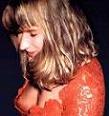







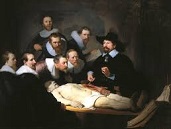

1632 In Feb. Pisa-born Italian super-brain scientist ("Father of Science") Galileo Galilei (1564-1642) pub. his "fictional" masterpiece Dialogue Concerning the Two Chief World Systems (Dialogho Sopra i Due Massimi Sistemi del Mondo), which becomes an immediate bestseller in Italy; in Sept. Pope Urban VIII finally gets a copy, shits bricks and orders its distribution stopped, and in Oct. Galileo receives a summons to appear before the friendly Roman Inquisition for reneging on his 1616 promise and only playing games with them, pretending to treat Copernicanism as a theory but anything but; the Medici family waffles but finally drops protection for him, and he has to go to Rome, where the outcome is unstoppable. On Mar. 29 the Treaty of Saint-Germain-en-Laye (near Paris) between England and France returns New France (Quebec) to French control and provides compensation to France for goods seized during its capture. On Apr. 15 40K Swedish troops under Gustavus II Adolphus defeat 25K Catholic League troops uner Count Johan Tilly (b. 1559) at the Battle of the Lech River (Rain) near Rain, Bavaria, with 2K Swedish vs. 3K Catholic casualties; Tilly is wounded trying to prevent the Swedes from crossing the Lech River into Bavaria, and dies on Apr. 30; Gustavus II Adolphus conquers Augsburg and Munich in May, then storms Wallenstein's entrenched camp near Nuremberg on Sept. 3 and is repulsed. On Apr. 21 the Dordrecht Confession of Faith is adopted by the Mennonites in Dodrecht, South Holland, with 18 articles incl. belief in salvation through Jesus Christ, baptism, non-resistance, excommunication and shunning, feet washing, and avoidance of oaths. On Apr. 30 king (since June 20, 1566) Sigismund III Vasa (b. 1566) dies, and his son Wladyslaw (Vladislav) (Ladislas) IV Vasa (1595-1648) becomes king of the Polish-Lithuanian Commonwealth (until May 20, 1648) after being elected with opposition, going on to pursue a policy diametrically opposed to his daddy's, unsuccessfully attempting to restrict the power of the Jesuits and starting a war with Russia (ends 1634). On June 20 Charles I issues a royal proclamation ordering the country gentlemen to leave London, and grants loyal Catholic George Calvert, 1st Lord Baltimore a Royal Charter to Maryland (named in honor of Queen Henrietta Maria), N of the Potomac River (Algonquin "where goods are brought in"), with unprecedented powers, although all exports are required to be sent to or through England; too bad, he dies on Apr. 15, and his son Cecilius Calvert, 2nd Lord Baltimore (1605-75) takes over. In 1655 after many years of plotting to take back Kent Island from Catholic Maryland, Jamestown Puritan leader William Claiborne defeats a force led by Md. gov. Stone in Providence (Annapolis), kills him, then takes control of Md., and travels to England to get official control, but they don't go for it and Sir George Calvert regains control; after the Puritan govt. in England is ousted in 1660, he finally gives up and contents himself with his little ole 5K-acre Romancoke estate on the York River in Va. In June Roman Catholic sympathizer Sir Francis Windebank (1582-1646) is knighted and appointed by Charles I as his chief secy. of state in England (until 1640), succeeding Lord Dorchester; he goes on in Dec. 1634 to discuss a possible reunion of the Anglican with the Roman Catholic Church with papal agent Gregorio Panzani (-1662), bishop of Mileto, with a plan to send pesky Puritans to war in the Netherlands to get them out of the way - he won the bank? On Nov. 6 king (since Oct. 30, 1611) Gustavus II Adolphus (b. 1594) of Sweden dies after being shot in the back while leading a cavalry charge at the Battle of Lutzen (Lützen) near Leipzig, in which Wallenstein is defeated, becoming the last battle between Protestants and Roman Catholics in Germany, and a Protestant Pyrrhic V, causing the Protestant campaign to lose direction; after Gustav kicks-off and the Swedish center breaks, German soldier Dodo zu Innhausen und Knyphausen (1583-1636) holds the panicky Swedish army together for two hours until Duke Bernhard of Saxe-Weimar (1604-39), col. of the horse guard takes over, kills another col. who refuses to lead a charge, and turns the battle into a V by sundown, eventually gaining his own command; Gustavus Adolphus' daughter Christina Wasa (1626-89) (whose portrait bears a striking resemblance to German tennis player Steffi Graf (1969-)?) ascends the throne of Sweden (until June 6, 1654), with five regents headed by chancellor Axel Oxenstierna governing the country (until 1644); too bad, Saxony now refuses to join the Protestant League under her, er, Swedish leadership, although its troops continue to fight (until 1635). On Dec. 5 after settlers in Zwaanendael (Swaanendael) (Dutch "swan valley or dale") (modern-day Lewes, Del.) (founded 1631), Delaware's first Dutch settlement in the S are massacred by the Indians, Capt. David Peterson de Vries arrives too late to help, then negotiates a treaty with the Indians and sails up the Delaware River trading for beans and corn before sailing to Virginia Colony to recruit new colonists, but the Dutch later removes them to New Amsterdam. On Dec. 20 Nicolas Antoine, a French Catholic pastor who converted to Judaism is executed. Cardinal Richelieu quashes the Montmorency Conspiracy, and has the 4th Duke Montmorency executed and his title forefeited; in 1689 the title is rename the duke of Enghien. The town of Dinkelsbuehl in C Franconia (modern-day Bavaria) surrenders to the Swedish army, and is saved from a massacre by singing children, one of whom reminds the Swedish gen. of his dead son, becoming known as the Kinderzeche (Ger. child's bill for food and drink at an inn). Imam Quli Khan is executed by Persian shah Safi I in order to absorb his lands and strengthen his central authority. Fasilides (Basilides) (1603-67) becomes Solomonid emperor of Ethiopia (until Oct. 18, 1667), going on to isolate Ethiopia from foreign influences, expel the Jesuits in 1633, restore the Ethiopian Orthodox Church, and found a new capital at Gondar (Gonder) N of Lake Tana in 1636, complete with cool Gondar Castle (Fasil Ghebbi) to counter invasions by Galla peoples to the S. Ahmad Koujak is appointed lord of Damascus by sultan Murad IV, who orders him to attack Lebanon and depose pesky Muslim Druze independence leader Emir Fakhr al-Din II (b. 1572), and after his son Ali is killed in Wadi el-Taym, he hides in Jezzine's Grotto (14 mi. E of Sidon), is captured and taken to Constantinople, where he sweet-talks the sultan into releasing him; too bad, the sultan takes his time, and finally has him and his family executed on Apr. 13, 1635; Lebanon becomes an Ottoman puppet until 1920. After the people of Watertown stage a protest against Mass. Bay Colony Gov. John Winthrop for levying taxes on them, he rebukes them, but restores the power of the General Court to elect the gov. and his deputy, rather than just assistants who pick him all the time. The Bishop of London is given jurisdiction over the Anglican churches in the Am. colonies, but regulation ends up being entrusted to the governors. The city of Portland, Maine (modern-day pop. 66K/519K) is settled as the fishing village of Casco on Casco Bay, which is taken over by the Mass. Bay Colony in 1658 and changes its name to Falmouth, which is destroyed by the Abenaki in 1676 during King Philip's War, then destroyed again by French and Indian allies in the 1690 Battle of Fort Loyal, then burned down by the British Royal Navy on Oct. 18, 1775; in 1786 it is refounded as Portland, named after the Isle of Portland off the coast of Dorset, England; in 1820 Maine becomes a U.S. state, with Portland as its capital until 1832, when it is moved N to Augusta; in 1851 Maine becomes the first state to pass a prohibition law, leading to the Portland Rum Riot on June 2, 1855; Portland, Ore. is later named after it. Flemish painter Sir Anthony Van Dyck (1599-1641) moves to England and becomes court painter to Charles I, going on to spend a decade painting many portraits of his royal patron and other nobles after being knighted, rewarded with a generous annuity and lavished with gifts; cheapskate Charles I pays him only half the asking price for a distinguished 1635 portrait. Claudio Monteverdi takes holy orders and retires from public life (until 1637). The English settle Antigua and Montserrat in the Leeward Islands group of the West Indies. Yakutsk, Siberia on the Lena River becomes a fur trading center. Swedish king Gustavus II founds the Univ. Academia Gustaviana in Tartu, Estonia. The West India Co. builds a brewery on Brewers (Brouwer) St. in Manhattan, New Amsterdam, led by gov.-gen. #5 (1633-8) Wouter van Twiller (1606-54), successor of Peter Minuit, becoming the first commercial brewery in North Am.; the street is later named Stone St. for its cobblestone paving. Architecture: Francois Mansart (1598-1666) designs the Church of the Visitation de Sainte-Marie in Paris. Cardinal Richelieu orders the construction of the Palais Royale in Paris. The Post Hotel is built in picture-book Mittenwald, Bavaria, a stop on the way to Munich, which later in this cent. becomes a center for violin manufacture after Stradivari's student Mathias Klotz (1653-1743) moves there. Nonfiction: Antonio Bosio, Roma Sotterranea; Or, An Account of the Roman Catacombs. Michael O Cleirigh et al., Annals of the Four Masters (1632-6); compiled at a Franciscan friary near the Drowes River in County Leitrim, Ireland, covering from the Deluge (2,242 years after Creation) to 1616 C.E. from an Irish standpoint; the first English tr. is pub. in 1846; they record a summer heat wave and drought in 1252. John Amos Comenius (1592-1670), Ratio Disciplinae Ordinisque Ecclesiae in Unitate Fratrum Bohemorum; history of the Moravians. John Davies (1569-1626), Welsh Dictionary. Phineas Fletcher (1582-1650), The Way to Blessedness; Joy in Tribulation. The Jesuits, Jesuit Relations (40 vols.) (1632-72); vol. 1 is Relation de la Nouvelle France, et du Voyage des Peres Jesuits dans cette Contree by Pierre Biard (1565-1622); also incl. Relatio Expeditionis Anglorum in Canadam suaeque ab illis Comprehensionis. William Prynne (1600-69), Histrio-Mastix (Histriomastix): The Players Sourge, or Actors Tragedie; how the Bible proves "that popular stage-playes are sinfull, heathenish, lewde, ungodly spectacles, and most pernicious corruptions". Caspar Schoppe (1576-1649), Flagellum Jesuiticum; against the Jesuits; followed by Mysteria Patrum Jesuitorum (1633), and Arcana Societatis Jesu (1635). John Selden (1584-1654), Mare Clausum; argues for England's sovereignty on the sea. Johann Angelus Werdenhagen (1581-1652), Introductio Universalis in Omnes Republicas Sive Politica Generalis (comparative politics). Art: Sir Anthony van Dyck (1599-1641), Philip, Lord Wharton. Rembrandt van Rijn (1606-69), The Anatomy Lesson of Dr. Nicolaas Tulp; The Abduction of Europa; Portrait of a Lady Aged 62. Plays: Richard Brome (1590-1653), The Northern Lasse. Ben Jonson (1572-1637), The Magnetic Lady. Philip Massinger (1583-1640), The City Madam (comedy). The Second Shakespeare Folio is pub. Poetry: Jacob "Father" Cats (1577-1660), Spieghel van den Ouden ende Nieuwen Tijdt. John Milton (1608-74), On Shakespeare (sonnet) (debut); pub. anon. in the Second Folio of Shakespeare's plays. Births: Anglo-Welsh poet (lesbian?) Katherine Philips (d. 1664) on Jan. 1 in London. German "De jure naturae et gentium" political philosopher-economist-historian Samuel von Pufendorf (d. 1694) on Jan. 8 in Dorfchemnitz, Saxony; educated at the U. of Leipzig. British colonial official in North Am. #1 (1676-) Edward Randolph (d. 1703) on July 9 in Canterbury, Kent. French Jesuit church orator Louis Bourdaloue (d. 1704) on Aug. 20 in Bourges. English "An Essay Concerning Human Understanding", "tabula rasa" empiricist Social Contract philosopher ("Father of Classical Liberalism") John Locke (d. 1704) on Aug. 29 in Wrington, Somerset; educated at Westminster School, and Christ Church, Oxford U.; founder of the school of Philosophical Empiricism. English architect-mathematician-astronomer Sir Christopher Wren (d. 1723) on Oct. 20 in East Knoyle. Dutch linen draper and late-blooming long-living zoologist Anton (Antony) (Antonie) (Thonius) Philips van Leeuwenhoek ("lion's corner") (d. 1723) [pr. low-en-HOOK] on Oct. 24 in Delft. Dutch Baroque painter Jan (Johannes) Vermeer (van der Meer van Delft) (d. 1675) on Oct. 31 in Delft; specializes in ordinary domestic interior scenes. French Benedictine "De Re Diplomatica" scholar (founder of paleography and diplomatics) ("greatest historical scholar of his century") Dom Jean Mabillon (d. 1707) on Nov. 23 in Saint-Pierremont, Champagne. Dutch rationalist humanist philosopher (Jewish) Baruch (Benedict de) Spinoza (d. 1677) on Nov. 24 in Amsterdam; born to a Jewish Marrano converso family; student of Franciscus van den Enden (1602-74) and Rabbi Menasseh Ben Israel (1604-57); educated at the Ets Hayyim Yeshivah in Amsterdam, then breaks with Judaism after his father dies. French composer and founder of French opera (tragedie lyrique) (gay) Jean-Baptiste Lully (Giambattista Lulli) (Giovanni Battista Lulli) (d. 1687) on Nov. 28 in Florence, Italy. English physician-scholar Henry Stubbes (d. 1676) in Lincolnshire; educated at Christ Church, Oxford U. Chinese Roman Catholic priest and painter Wu Yushan (d. 1718). Deaths: Flemish gen. Count Tilly (b. 1559) on Apr. 30 in Ingolstadt. English aristocrat Henry Percy, 9th earl of Northumberland (b. 1564) on Nov. 5 in Petworth, West Sussex. Polish king (1587-1632) and Swedish king (1592-9) Sigismund III Vasa (b. 1566) on Apr. 30 in Warsaw. English playwright Thomas Dekker (b. 1570) on Aug. 25. Italian poet Giovanni Battista Basile (b. 1575) on Feb. 23. English statesman (founder of Md.) George Calvert, 1st Lord Baltimore (b. 1579) on Apr. 15 in Lincoln's Inn Fields, London. English political leader Sir John Eliot (b. 1592) on Nov. 27; dies in the Tower of Lonson; his prison works are not pub. for 250 years, incl. De Jure Majestatis. Swedish king (1611-32) Gustavus II Adolphus (b. 1594) on Nov. 6 (killed in battle). French-Dutch mathematician Albert Girard (b. 1595) on Dec. 8 in Leiden; first to discuss imaginary numbers (square root of -1), provide an inductive definition for Fibonacci numbers, and use the abbrevs. sin, cos, and tan for trig functions; states this year that each prime of the form 1 mod 4 is the sum of two squares. Bavarian exiled Winter King Frederick V (b. 1596) on Nov. 29 in Mainz.









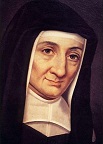



1633 A plague outbreak in Munich, Bavaria kills 15K. In Jan. Axel Oxenstierna is designated legate plenipotentiary in Germany by the king, with absolute power over all territories conquered by the Swedish armies, making him the most powerful statesman in Swedish history (until ?); he organizes the Protestant leaders of Sweden and Germany into the Evangelical League for mutual assistance against mean Roman Catholics; in Jan. German soldier Dodo von Knyphausen is rewarded for his bravery at Lutzen last year with a promotion to field marshal in the Swedish army in charge of Lower Saxony. On Feb. 1 the Tobacco Laws are passed, limiting Va. tobacco production supposedly to prevent their dependence on a 1-crop economy. Speaking of mean Roman Catholics? On Feb. 13 Galileo arrives in Rome, is interrogated (tortured) by the Big I in Apr., pleads guilty to a lesser charge in exchange for a more lenient sentence (please, I don't want to squat to pee?), is found guilty (3 of 10 Cardinal judges withholding their signatures), and on June 22 in the Dominican Convent of Santa Maria Sopra Minerve he is forced to abjure his belief in the *!?! Copernican hypotheses; after prostrating himself in the white nightshirt of a penitent and kissing their holy feet for saving his soul he is sentenced to an indefinite prison term; in Dec. he is allowed to return to Florence under permanent house arrest at his villa in Arcetri, becoming the end of any remaining claim the Church could make to having any direct pipeline to God; the chilling effect is instant, with French brain man Rene Descartes withholding pub. of Le Monde (The World) (Treatise on the Light) next Apr. because it agrees with the Copernican theory, "and I confess that if it is false, then so are the whole foundations of my philosophy, because it is demonstrated from them beyond doubt" (he turns into the "philosophe au masque"); as late as 1739-42 an ed. of Newton's Principia is pub. with a cover letter by Minim Fathers Le Seur and Jacquier pointing out to good Roman Catholics that the Newtonian system of the world is also "hypothetical". On Apr. 10 the first bananas are displayed in London by Thomas Johnson of Snow Hill - yes, we have no jokes here? On Apr. 23 the lull in the Thirty Years' War caused by the death of Gustavus II Adolphus of Sweden is broken by the Heilbronn League, in which France and the Protestant countries of W Germany agree to stand together against the Catholic League behind Sweden under the leadership of chancellor Axel Oxenstierna of Sweden, Gustavus' right-hand man; unfortunately the peasantry can't support the large armies in their lands, so there is not much fighting this year. On June 18 Charles I is crowned king of Scotland in Hollyrood Abbey in Edinburgh, visiting the Scottish lowlands, attending parliament and feasting with the nobility, who are nowhere near as happy as when his daddy James I visited in 1617 since he goes from basically ignoring the country and letting his councillors handle affairs to meddling with the govt. and increasing taxes, upsetting everybody; the Royal Scots Regiment (originally the Royal Regiment of Food) (oldest regular regiment in the British Army) is established (ends 2006). On July 10 the Blessing, a ferry carrying gold and silver for Charles I sinks in the Firth of Forth. On July 14-Oct. 22 the Battle of Liaoluo Bay sees a large Ming Dynasty fleet under Zheng Zhilong defeat a Dutch India Co. fleet under Adm. Hans Putmans at Quemoy Island, becoming the largest naval battle between Chinese and Euro forces until the Opium Wars of 1839-42. On Sept. 3 Rev. Thomas Hooker (1586-1647), a Cambridge-educated Puritan pastor from Essex, England arrives in the Mass. Bay Colony in the ship Griffin from Holland, where he had been chased in 1630 by Archbishop Laud under threat of arrest, and on Oct. 11 becomes pastor of the church at Newtown (Cambridge), soon getting in a mutually-respectful spat with Gov. Winthrop over restriction of voting rights, with Winthrop uttering the soundbyte: "The best part is always the least, and of that best part the wiser part is always the lesser", to which Hooker upstages him with the immortal soundbyte: "In matters which concern the common good, a general council, chosen by all, to transact businesses which concern all, I conceive most suitable to rule and most safe for relief of the whole" - did you have any bad dreams, did you break any glass? On Sept. 26 after Puritan Separatist Edward Winslow (1595-1655) (hated by James I) becomes gov. #3 of Plymouth Colony and inspects the site, Windsor, Conn. 50 mi. upriver from Long Island Sound is founded as a trading post by Englishmen from Plymouth led by William Holmes; meanwhile Ft. Good Hope (Goede Hoop) (near present-day Hartford, Conn.) is built by the Dutch 10 mi. down the Connecticut River in New Netherland, going on to rais their first tobacco crop. On Sept. 27 after invading Silesia, Wallenstein defeats the Swedish army under Duke Bernhard of Saxe-Weimar at the Battle of Steinau, then goes into winter HQ in Bohemia, making the mistake of trying to negotiate a deal between the Protestants, Roman Catholics and the HRE, which causes certain Catholic princes (Maximilian of Bavaria et al.) to want him done away with, and HRE Ferdinand II to suspect him of treachery. In Oct. William Laud (1573-1645), bishop of London (since July 1628) and chancellor of Oxford U. (since 1630), a friend of the Duke of Buckingham becomes archbishop of Canterbury (until Jan. 10, 1645), introducing Laudianism, which rejects Calvinist predestination and emphasizes Roman Catholic-style clerical hierarchy and liturgical ceremony, bringing in new censors Samuel Baker (chaplain to William Juxon), William Bray, William Haywood, and Matthew Weeks, targeting not only the Calvinists but the Puritans, causing an exodus of religious dissidents incl. Anne Hutchinson, John Lothropp, and Zechariah Symmes; William Juxon (1582-1663) takes his old job of bishop of London (until 1649), becoming next in line for the top job; meanwhile in May the 30-40 member Privy Council being too large, Charles I entrusts colonial affairs to an 11-man Lords Commissioners for Plantations in General, which becomes known as the Laud Commission, headed by Archbishop William Laud, who schemes to impose political and religious conformity on New England. The French occupy Lorraine (until 1659). The Jews of Posnan (Poznan) are given the privilege of forbidding Christians to enter their quarter. Shogun Tokugawa Iemitsu begins issuing the Sakoku (Jap. "locked country") Edicts (until 1639), closing Japan's borders to foreigners, and forcing the pesky Portuguese out; by 1641 only a small group of Dutch merchants remain on the artificial Dejima (Deshima) Island (Jap. "Protruding Island") in Nagasaki Bay; they remain in effect until 1853. Fire destroys the N third of London Bridge after a maidservant leaves a pail of ashes under some wooden stairs. Charles I revives the forest eyre to raise fine money. Middle Plantation in Va. is settled, changing its name to Williamsburg in 1699. An English trading post is established in Bengal. The great English church question of the position of the Communion Table at St. Gregory's comes to a head. Jean du Vergier du Hauranne (1581-1643), a student of Cornelius Jansen (d. 1638) becomes dir.-confessor of the Convent of Port-Royal, France, turning it into a center of Jansenism; too bad, Cardinal Richelieu has him imprisoned in 1638, and in 1661 the convent is closed, then destroyed on orders of Louis XIV in 1710. John Cotton (1585-1652), pastor of St. Botolph's Church in Boston, Lincolnshire, England (from 1612) is summoned before Archbishop Laud and the Court of High Commissions to answer for his Puritan leanings, causing him to flee and arrive in Sept. in Boston, Mass. Bay Colony, where he becomes a religious leader ("the Patriarch of New England") and teaches in the First Church until death. Cambridge U. establishes a professorship of Arabic studies. Father Jean de Brebeuf returns to his Catholic mission in the Huron village. Sultan Murad IV orders tobacco smokers executed as infidels. The title of Earl of Lindsay is created for John Lindsay, 10th Lord Lindsay, who later inherits the ancient Earldom of Crawford, uniting the two earldoms until the death of the 22nd earl of Crawford (6th earl of Lindsay) in 1808, when the earldom of Lindsay passes to David Lindsay while the earldom of Crawford goes dormant (until 1848); the family seat is Lahill House near Upper Largo, Fife. The Company of the Daughters of Charity of Saint Vincent de Paul are founded by St. Vincent de Paul (1581-1660) and St. Louise de Marillac (1591-1660), nursing the poor in their homes; "Having no monastery but the homes of the sick, their cell a hired room, their chapel the parish chuch, their enclosure the streets of the city or wards of the hospital." Mission San Luis de Apalachee (de Talimali) in the Fla. panhandle 2 mi. of modern-day Tallahassee, Fla. is built by two Spanish friars. Portuguese Jesuit missionary (since 1609) Cristovao Ferreira (1580-1650) is captured and tortured for five hours until he commits apostasy, and converts to Zen Buddhism, changing his name to Sawano Chuan, then pub. a book titled "The Deception Revealed". Leiden U. Observatory is founded to house the quadrant of Snellius (of Snell's Law fame), and goes on to become the oldest univ. observatory to survive to modern times. A wind sawmill is erected near the Strand in London. The village of Reuil is sold by the Abbey of St. Denis to Cardinal Richelieu, who turns it a magnificent estate. Architecture: Francois Mansart designs the elegant Hotel de la Vrilliere (Hôtel de La Vrillière) in the 1st arrondissement of Paris (finished 1640), which in 1712 becomes the Hotel de Toulouse, the Imprrimerie de la Republiquei n 1795, and the Hotel de la Banque de France in 1811. Nonfiction: Rene Descartes (1596-1650), Les Monde ou Traite (Traite) de la Lumiere (Lumière); on cosmology. Sir Fulke Greville, A Treatie (Treaty) of Humane Learning. Edmund Spenser (1552-99), A View of the Present State of Ireland (posth.). Art: Jacques Callot (1592-1635), Les Grandes Miseres de la Guerre (The Great Miseries of the War); 18 prints showing the horrors of war, incl. pillaging by soldiers and reprisals by the authorities and peasants. Sir Anthony van Dyck (1599-1641), Equestrian Portrait of Charles I; Queen Henrietta Maria with Sir Jeffrey Hudson. Jacob van Campen and Pieter Post, Mauritshuis, The Hague. Rembrandt van Rijn (1606-69), Portrait of a Bearded Man in a Red Coat; sells for £6.27M at Sotheby's in 1998. Le Sueur, Equestrian Statue of Charles I; erected in 1674 on the site of Charing Cross in Westminster. Francisco de Zurbaran (1598-1664), Still Life: Lemons, Oranges, and a Rose; Norton Simon's favorite painting of all time. Plays: Pedro Calderon de la Barca (1600-81), Devotion to the Cross. Thomas Carew (1594-1640), Coelum Britannicum (masque). Pierre Corneille (1606-84), La Galerie du Palais. John Ford (1586-1640), The Broken Heart; 'Tis Pity She's a Whore (tragedy). Ben Jonson (1572-1637), The Tale of a Tub. Christopher Marlowe (1564-93), The Jew of Malta (tragedy) (posth.). Philip Massinger (1583-1640), The Guardian (comedy); pub. in 1655; dirty old man Durazzo of Naples, his nephew Caldoro, and his babe Calista, who goes for Adorio. John Milton (1608-74), Arcades (masque). Poetry: Abraham Cowley (1618-67), Poetical Blossoms; pub. at age 15; contains a poem written at age 10. John Donne (1572-1631), Poems, incl. The Flea (which compares a flea mingling the blood of lovers to sex), The Sun Rising, Song ("Go and catch a falling star,/ Get with child a mandrake root,/ Tell me where all past years are,/ Or who cleft the devil's foot"), A Valediction Forbidding Mourning ("Such wilt thou be to me, who must,/ Like th' other foot, obliquely run;/ Thy firmness makes my circle just,/ And makes me end where I begun"); also Holy Sonnets, incl. Death Be Not Proud (#10). Phineas Fletcher (1582-1650), The Purple Island, or the Isle of Man; his magnum opus, comparing the human veins to rivers, bones to mountains, etc.; incl. "Piscatorie Eclogues and Other Poetical Miscellanies", about boys fishing on the banks of the Cam River. George Herbert (1593-1633), The Temple, or Sacred Poems and Private Ejaculations; 160 religious poems by the rector of Bemerton, Wiltshire (1630-3), many of which are turned into popular hymns incl. "King of Glory, King of Peace", "Let All the World in Every Corner Sing", and "Teach Me, My God and King (The Elixir)"; "But since our Saviour's death did put some blood/ Into thy face;/ Thou art grown fair and full of grace,/ Much in request, much sought for as a good"; "But can he want the grape, who hath the wine?/ I have their fruit and more./ Blessed be God, who prosper'd Noah's vine,/ And made it bring forth grapes' good store./ But much more than him I must adore,/ Who of the Laws' sour juice sweet wine did make,/ Ev'n God himself being pressed for my sake." Births: English London diarist and English secy. of the navy Samuel Pepys (d. 1703) (pr. PEEPS) on Feb. 23 in Bampton, London; educated at St. Paul's School, and Magdalene College, Cambridge U. Am. Mass. minister Samuel Whiting Jr. (d. 1713) on Mar. 25; educated at Harvard U. Japanese emperor #110 (1643-54) Go-Komyo (Tsuguhito) (d. 1654) on Apr. 20; 4th son of Go-Mizunoo (1596-1680); brother of Meisho (1624-96). French fortifications expert Marshal Sebastien Le Prestre, Marquis de Vauban (d. 1707) on May 15 in Saint-Leger Vauban (Yonne). French inventor-traveler-scientist Jean de Thevenot (Thévenot) (d. 1667) on June 16 in Paris; educated at the College de Navarre; nephew of Melchisedech Thevenot (1620-92). German duke of Brunswick-Luneburg (1685-1714) Anthony Ulrich (d. 1714) on Oct. 4 in Hitzacker; 2nd son of Augustus the Younger (1579-1666); brother of Rudolph Augustus (1627-1704) and Ferdinand Albert (1636-87). English-Scottish king (1685-8) James II/VII (d. 1701) on Oct. 14 in St. James's Palace, London; 3rd son (2nd surviving son) of Charles I and Henrietta Maria; named after his grandfather James I/VI; at his baptism he is created duke of York and Albany, causing New York state and Albany, N.Y. to later be named after him (plus Jamestown, Va.); he is given a practical scientific education and becomes a cunning, er, skilled linguist; husband of Anne Hyde (1660-71) and Mary of Modena (1673-). Italian librarian-bibliophile-scholar Antonio de Marco Magliabechi (Magliabecchi) (d. 1714) on Oct. 29 in Florence; starts out as a goldsmith until age 40. Italian physician ("the Father of Occupational Medicine") Bernardino Ramazzini (d. 1713) on Nov. 3 in Carpi, Modena; educated at the U. of Parma. Dutch marine painter Willem van de Velde the Younger (d. 1707) on Dec. 18 in Leiden; son and pupil of Willem van de Velde the Elder (1611-93); at his best when portraying Dutch Vs over the English? Deaths: Anglican clergyman (founder of the English Separatists) Robert Browne (b. 1550) on Oct. 7 in Northampton; dies in gaol. Spanish Carmelite nun Marina de Escobar (b. 1554) on June 9 in Valladolid. Italian composer Jacopo Peri (b. 1561) on Aug. 12 in Florence. English archbishop of Canterbury (1611-33) George Abbott (b. 1562) on Aug. 5 in Croydon, London. English sci-fi writer Frances Godwin (b. 1562) in Apr. in Whitbourne, Herefordshire. Chinese writer Xu Guangqi (b. 1562) on Nov. 8 in Beijing. German duke (1572-96) John Casimir of Saxe-Coburg (b. 1564) on July 16 in Coburg. Dutch dribbling submarine inventor Cornelius Drebbel (b. 1572) on Nov. 7 in London. English MP (1601-22) Henry Cary, 1st viscount Falkland (b. 1575) in Sept; dies after breaking a leg in Theobalds Park, requiring it to be amputated; leaves The History of the Most Unfortunate Prince, King Edward II, with Choice Political Observations on Him and His Unhappy Favourites, Gaveston and Spencer (pub. in 1680). French explorer Etienne Brule (b. 1592) (murdered by the Hurons). English poet George Herbert (b. 1593) on Mar. 1 in Bemerton, Wiltshire; "[Herbert composed] such hymns and anthems as he and the angels now sing in heaven." (Izaak Walton)
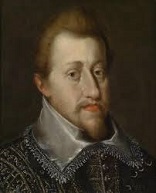





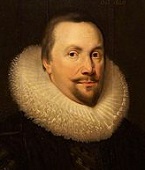


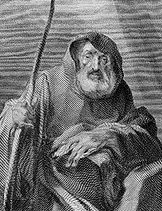
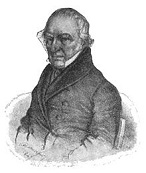
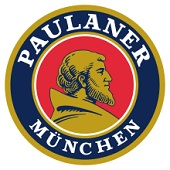

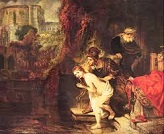
1634 A plague oubreak in Munich this year and next kills 15K of 40K; after it bypasses them, causing villagers to attribute their luck to a vow made to Mary and Jesus, the first passion play is performed in Oberammergau in Bavaria (42 mi. SSW of Munich), and every 10 years thereafter; after it becomes a tourist cash cow, it is held in 1900, 1910, 1922, 1930, 1934 (300th anniv.), 1950, 1960, etc. Early in the year each town in Mass. sends two delegates to Boston, and they demand that Gov. Winthrop produce the colony's charter, which he had never let them see since he claimed that he and not the General Court has the power to pass laws and levy taxes; he relents, and when they find out about his shenanigans they turn the General Court into a representative body, and elect Northampton-born deputy gov. Thomas Dudley (1576-1653) (a stern Puritan, who often differs with tolerant Winthrop) to a 1-year term as Mass. gov. #2 (until 1635) (first of 4x). Bay Colony, beginning when John Winthrop's term elapses in May. Don't do me like that, what if I love ya baby, don't do me like that? On Feb. 24 Albrecht von Wallenstein (b. 1583) is assassinated by some Irish and Scottish officers after HRE Ferdinand II decides he's getting too powerful. On Mar. 4 the first tavern in America is opened in Boston, Mass. by Samuel Cole. On Mar. 25 the Roman Catholic Colony of Maryland (Md.) (named after Queen Henrietta Maria, although they must have snickered about sneaking the Virgin Mary in the back door) is founded on the N shores of Chesapeake Bay by English Catholic settlers led by Lord Baltimore's son Leonard Calvert (1606-47), arriving in the ships Ark and Dove; they buy a native settlement (renamed St. Mary's) from friendly Indians near the mouth of the Potomac River at St. Clement's (now Blakistone) Island; the charter granted by Charles I makes this the first English proprietary colony (owned by an individual, not a joint stock co.); the proprietor is granted powers similar to those of an independent monarch, although the laws must be in accordance with those of England. On June 14 the Treaty of Polianovska (Polianov) is signed, and Wladyslaw IV of Poland renounces his claims to Russia in return for the Smolensk region. On July 29 Sweden promulgates the Instrument of Govt., its first constutition. On Aug. 18 French priest Urbain Grandier (b. 1590) is burned at the stake in Loudun for allegedly seducing an entire convent of Ursuline nuns with the help of the Devil; he had been tried once and acquitted, then publicly insulted Cardinal Richelieu, who got him a more urbane grander trial, where he is tortured into confessing. On Aug. 27 after the Swedes capture Brandenburg, HRE (since Aug. 28, 1619) Ferdinand II (1578-1637), champion of Roman Catholicism and hater of Protestantism names Austrian gen. Matthias Gallas (Matteo Gallasso), Count of Campo, Duke of Lucera Gallas (1584-1647) as his new CIC; on Sept. 5 HRE Ferdinand II (whose portrait bears a striking resemblance to a cross-dressing woman with fake facial hair?), with the help of his son Ferdinand of Hungary (later Ferdinand III) wins the Battle of Nordlingen against the Protestant mercenary army of marshal Gustav Horn, Count of Pori (1592-1657), and reconquers Wurttemberg and Franconia, reaching the height of his imperial power, but still unable to quash Protestantism throughout his emptying empire; the Heilbronn Union collapses, and the Protestants of SW Germany turn to Richelieu's France for help; in Oct. the HRE, king of Spain, and the Roman Catholic princes of Germany agree to a joint attack on France. On Sept. 18 Anne Hutchinson (1591-1643) arrives in the Mass. Bay Colony with her merchant hubby and 13 children, and soon begins hosting home meetings where she preaches Antinomianism, the doctrine that salvation is by faith and grace alone, not by observance of moral laws incl. the Law of Moses, and that some Puritan ministers are wrong to preach salvation by works, causing the latter to begin working, er, conspiring against her. In Dec. the HRE, king of Spain, and Roman Catholic princes of Germany agree to jointly attack France, which Louis XIII learns about, causing him to plan a preemptive strike. A Spanish decree declares Havana the "key to the New World and bulwark of the West Indies". Ligdan Khutugtu Khan (b. 1588), the last great Mongol Tumeng ruler of the Northern Yuan Dynasty dies, and Abahai absorbs them, changing the name of his people to Manchus (from Manjusri, bodhisattva of learning), and claiming the S and E portions of their territory as Inner Mongolia. Mirza (Saru) Taqi (-1645) is appointed grand vizier (PM) of Persia, dominating the Safavid govt. Charles I of England attempts to levy ship money, a tax that applies only to ports to all American colonies, stirring tremendous animosity; meanwhile his puppet Sir Thomas Coventry, 1st Baron Coventry (1578-1640) (lord keeper since Nov. 1, 125) tries to get it extended to inland counties, "so that they might not be enforced to fight", adding that "wooden walls" of ships are "the best walls of this kingdom". French explorer Jean Nicolet (1598-1642) crosses Lake Michigan and lands at Green Bay (originally La Baie des Puants, "Bay of Stinking Waters") (modern-day pop. 104K/312K), home of the Menominee and Winnebago (Ho-Chunk) people to explore the region; expecting Chinese, he dresses in bright-colored flowery Chinese robes; the city grows up at the mouth of the Fox River 112 mi. N of Milwaukee, Wisc. The Dutch capture the 40 mi. x 10 mi. island of Curacao (Curaçao), 60 mi. NW of Venezuela from the Spanish. The English settle Cochin in Malabar. Covent Garden Market, a wholesale fruit, vegetable market in Nine Elms, London (between Vauxhall and Battersea, South West London) opens, becoming known as "London's Larder". Smoking is outlawed in Russia by Tsar Michael I. Samuel Cole becomes the first person to be licensed in Boston, Mass. to operate a tavern. The Paulaner Brewery is founded in Munich, Bavaria, Germany by the Minim friars of the Neudec on der Au cloister, and named after Paola, Italy-born founder (St.) Francis of Paola "the Fire Handler") (1416-1507); every spring it brews a special strong beer called Holy Father, which is later called Salvator, and on Apr. 2 the elector of Bavaria attends the annual tapping of the first keg and is served the first mug, which is followed by the 8-day Ausschank festive sale of beer; on Feb. 26, 1780 elector Karl Theodor permits the monks to serve beer to the public year-round; the Holy Father Feast of 1799 is attended by the whole court of elector Maximilian IV Joseph, becoming Munich's largest Volkfest to date; later in the year the cloister on Neudeck Strasse is closed and converted into a penitentiary, and the brewery opposite it is appropriated and sold to the Sovereign Military Order of Malta in 1803; in 1806 Franz Xaver Zacheri (1772-1849) leases it, purchasing it in 1813; in 1820 it becomes one of the six brewers furnishing beer to the annual Oktoberfest; in 1835 it introduces Salvator Doppelbock, followed in 1838 by Schumacher Alt; in spring 1861 the Salvator-Ausschank is moved to the Salvatorkeller in Nockherberg, a small terrace on the E bank of the Isar River in the district of Au in Munich, starting on the Sun. before St. Joseph's Day (Mar. 19), featuring the first Salvator Speech; in 1928 the brewery merges with Gebruder Thomas Brewery; in 1939-50 there is no annual festival, after which the speeches turn into derbleckt or friendly insults of German politicians; in 1994 Paulaner Brewery is acquired by the Kulmbacher brewery group, owned by Heineken and Schorghuber Ventures. Architecture: Boston Common in Boston, Mass. is begun, finding use as a cow pasture, leading to overgrazing, with usage limited to 70 cows at a time until they are officially banned in 1830 by mayor Harrison Gray Otis- so what do we call this area? Sports: The first Gold Cup event in horseracing in Newmarket, London, England is held. A 4-mi. horserace is held at the Curragh in County Kildare, Ireland; the Earl of Ormond's horse defeats Lord Digby's horse; some claim that chariot races were held there as far back as the 3rd cent. C.E. Inventions: Philip White of England patents iron anchor chains for ships, but until the 19th cent. they are considered either too expensive or experimental. Nonfiction: Meric Casaubon (1599-1671), The Meditations of the Roman Emperor Marcus Aurelius. Geoffrey Keating (1569-1644), The History of Ireland (Foundation of Knowledge on Ireland) (Foras Feasa ar Eirinn); from Creation to the 11th cent. Norman invasion; The Three Shafts of Death; The Key-Shield of the Mass; written in Irish Gaelic, which the English authorities won't permit to be printed, causing them to circulate it in ms. form. Thomas Mouffet, Theatrum Insectorum. William Wood, New England Prospect. Art: Trophime Bigot (1579-1650), St. Laurence Condemned to Torture (Arles); Assumption of the Virgin. Sir Anthony Van Dyck (1599-1641), The Lamentation. Carel Fabritius (1622-54), The Goldfinch. Nicolas Poussin (1594-1665), Hymenaios Disguised as a Woman During an Offering to Priapus (1634-8); Priapus' erect penis is covered up by the Spanish royal family, and rediscovered in 2009. Rembrandt van Rijn (1606-69), Artemisia; Susanna and the Elders; Portrait of Maerten Soolmans. Georges de La Tour, The Cheat With the Ace of Clubs. Francisco de Zurbaran (1598-1664), The Siege of Cadiz. Music: John Milton (1608-74), On Sept. 29, 1634 (Michaelmas) Cheapside, London-born Cambridge U. grad (1629) John Milton (1608-74) presents Comus: A Mask Presented at Ludlow Castle, 1634, on Michaelmas Night, before the Right Honorable John, Earl of Bridgewater, Viscount Brackly, Lord President of Wales, and One of His Majesty's Most Honorable Privy Council (masque); presented on Sept. 29 (Michaelmas); about the Lady, who gets lost in the woods and encounters Comus, the god of revelry, who offers to help her find her lost brothers and kidnaps her instead and takes her to his pleasure palace and ties her to an enchanted chair with "gums of glutinous heat", attempting to talk her into doing the wild thing with him, while she fends him off with philosophy; meanwhile her brothers come upon the Attendant Spirit in the form of a shepherd, who rescues her, after which Severn River water nymph Sabrina frees her from the chair; Comus is then saved by Sabrina, nymph of the Severn River. Plays: Juan Ruiz de Alarcon y Mendoza (1581-1639), Comedias, Vol. 2; incl. Las Paredes Oyen, Todo es Ventura. Pierre Corneille (1606-84), La Veuve (comedy); La Suivante (comedy). Sir William Davenant (1606-68), The Wits (comedy); Love and Honour (tragicomedy). John Ford (1586-1640), The Chronicle History of Perkin Warbeck (historical drama). John Ford (1586-1640) and Thomas Dekker (1572-1632), The Fairy Knight; The Bristowe Merchant. Jean Mairet (1604-86), Sophonisbe; first classical French tragedy, based on the three unities. John Milton (1608-74), Comus (masque praising chastity); Comus is a young Greek-Roman god of festivity and revelry. Novels: Giovanni Battista Basile (1575-1632), The Pentamerone (Tale of Tales) (Cunta de la Cunti) (1634-6); 10 women tell a prince 50 tales over five days; first description of Cinderella, Rapunzel, and Snow White. Births: German composer Adam Krieger (d. 1666) on Jan. 7 in Drisen, Neumark. Dutch Baroque painter Nicolaes Maes (Maas) (d. 1693) in Jan. in Dordrecht. French "The Princess of Cleves" novelist Madame de La Fayette (Marie-Madeleine Pioche de La Vergne, Comtesse de La Fayette) (d. 1693) on Mar. 18 in Paris. Italian duke of Savoy (1638-75) Charles Emmanuel II (d. 1675) on June 20 in Turin; son of Victor Amadeus I (1587-1637) and Christine Marie (1606-63). British vice-adm. Thomas Butler, 6th Earl of Ossory (d. 1680) on July 8 in Kilkenny, Ireland; eldest son of James Butler, 1st duke of Ormonde (1610-88). Turkish grand vizier (1676-83) Merzifonlu Kara Mustafa (Mustapha) Pasha (d. 1683) near Merzifon; son of Uruc Hasan Bey; adopted by the Koprulu family as a child, rising to cmdr. of the Ottoman Grand Fleet in the Aegean by 1663. English writer (vegetarian) Thomas Tryon (d. 1703) on Sept. 6 in Bibury (near Circencester), Gloucestershire. Italian late Baroque painter Luca Giordano (d. 1705) on Oct. 18 in Naples; pupil of Jusepe de Ribera (1591-1652); known as "Fa Presto" (It. "hurry up") from either his speed or his greedy daddy whining to hurry up and make some more. Russian theologian Mikola Mandelstahm (d. 1681). German botanist-physician Paul Amman (d. 1691) in Breslau; educated at the U. of Leipzig. French architect Francois d'Orbay (d. 1697) in Paris. Deaths: Englist jurist Sir Edward Coke (b. 1552) on Sept. 3: "The house of every one is to him his castle and his fortress" - things go better with Coke? English writer-poet George Chapman (b. 1559). German surgeon Wilhelm Fabry (b. 1560) on Feb. 15 in Bern, Switzerland. Paraguayan-born Spanish gov. of Rio de la Plata (1597-9) and Paraguay (1615-17) Hernando Arias de Saavedra (b. 1561) in Santa Fe, Argentina. Italian composer-organist-poet Adriano Banchieri (b. 1568) in Bologna. German publisher Johann Carolus (b. 1575). English satirist-dramatist John Marston (b. 1576). English jurist William Noy (b. 1577) on Aug. 9 in London (kidney stones). Ukrainian divine Meleci Smatrycki (b. 1578). Austrian gen. Albrecht von Wallenstein (b. 1583) on Feb. 24 (assassinated). Mongol khan (1603-34) Ligdan Khan (b. 1588) in Sira Tala, Gansu. Italian chess player Gioacchino Greco (b. 1600); leaves The Royal Game of Chess-play.




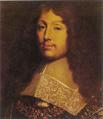



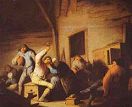
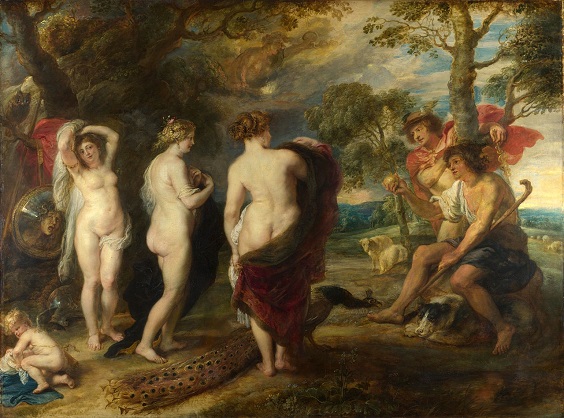
1635 In Jan. the Divine Tragedy sees eight young men skating on a prohibited holy day (Sun.) drowned in Gainsborough; the harsh winter brings 20-ft. snowdrifts. On Feb. 13 the Boston Public Latin School (English High and Latin School), the first public secondary school in the U.S. (Ben Franklin's alma mater) is founded. On Feb. 22 the super-elite Academie Francaise is founded in Paris by Cardinal Richelieu to preserve the purity of the French language - and I looked around me and there were all these shapes being sucked into the flames? In Feb. French minister Cardinal Richelieu supplies the Dutch with 20K men, cuts off the Valtellina in Mar., then declares war on the Spanish Hapsburgs on May 19 after the latter march into French-protected (since 1631) Trier and capture the elector archbishop, freaking him out abut French territory being surrounded by Hapsburg territories, reviving the War of the Mantuan Succession (1628-31) and launching the Franco-Spanish War (ends Nov. 7, 1659). On Apr. 18 fearful of Germany, Cardinal Richelieu of France and Axel Oxenstierna of Sweden sign the Treaty of Compiegne in Paris. On May 30 the Peace of Prague, negotiated by HRE Ferdinand II and elector Johann George I of Saxony is signed by most of the German Protestant states, who are satisfied with the terms of the 1555 Peace of Augsburg being reestablished as on Nov. 12, 1627 in return for agreeing that states of the HRE can no longer make formal alliances, that their armies are to be unified under the HRE, and all princes are to be granted amnesty except pesky Frederick V; the Thirty Years' War is now reduced to France and Sweden vs. the Hapsburgs; Johann George I is given Lusatia, and his son Augustus is allowed to keep the archbishopric of Magdeburg, after which he flops and declares war on Sweden. On May 10 William Claiborne and his Kent Island settlers get in a naval battle with Sir George Calvert's Maryland settlers in Pocomoke Sound, and after three Virginians are killed, Claiborne is defeated, and Va. gov. John Harvey reins him in under orders from England, but Claiborne's supporters get him ousted, and the battle continues until 1638, when Claiborne loses his appeal in England, and gets another charter for Ruatan Island off the coast of Honduras, which is taken over by the Spanish in 1642, causing him to go back to plotting to get Kent Island. On June 28 the French colony of Guadeloupe in the Caribbean (300 mi. SE of Puerto Rico) is established. On July 31 after recommendations by new postmaster (since 1632) Thomas Witherings (-1651), Charles I issues a proclamation making the royal postal service available to the public, and establishing the first inland postal service in Britain between London and Edinburgh, leading to the creation of the British Post Office in 1660. In July France signs an agreement with Savoy, Parma, and Mantua for a joint campaign in N Italy; the high taxes the French raise for the war make Richelieu unpopular. On Aug. 24-25 the Great Colonial Hurricane of 1635 brushes Jamestown, Va. before hitting SE New England incl. Mass Bay Colony and R.I., creating 14-20-ft. storm surges, destroying thousands of trees and many houses, becoming the most powerful hurricane in New England since colonization; the small barque Watch and Wait of Isaac Allerton founders off Cape Ann killing 21 of 23 aboard, later becoming the subject of John Greenleaf Whittier's poem "The Swan Song of Parson Avery"; Boston is spared the high tides, which sweep over Dorchester. On Sept. 12 the Treaty of Stuhmsdorf (Sztumska Wies) strikes 26.5-year truce between Sweden and Poland-Lithuania; Sweden give up its share in the Danzig customs to help Danzig recoup its 10M guilder loss in the war. In Oct. after questioning the right of the king to grant land to the colony without first buying it from the natives, pissing them off, London-born Puritan immigrant (since Feb. 5, 1631) Roger Williams (1603-83) is banished from the Mass. Colony by the gen. court in Boston for his "new and dangerous ideas" incl. separation from the Church of England, complete separation of church and state, and freedom from coercion in matters of faith; "When they have opened a gap in the hedge or wall of separation between the garden of the church and the wilderness of the world, God hath ever broke down the wall itself, removed the candlestick, and made His garden a wilderness, as at this day." The Treaty of St. Germain-en-Laye (near Paris) provides for regular French subsidies to the army of Bernhard of Saxe-Weimar. The Franco-Spanish War of 1635 (ends 1659) sees Cardinal Richelieu of France declare war on Spain because its territory is surrounded by Hapsburg territories and it needs to break out, plus the 1634 Battle of Nordlingen led to many of Protestant Sweden's allies defecting to the Hapsburg side, and he wants France to help it stay in the fight. Peter Stuyvesant becomes Dutch gov. of Curacao in the West Indies. Edward Winslow visits England as an agent for Plymouth Colony, and is imprisoned for several mo. by Archbishop William Laud on charges of offenses against the Anglican Church. Augustus the Younger (1579-1666) becomes duke of Brunswick-Luneburg (Brunswick-Lüneburg), who last ruler died last year; because of the Thirty Years' War he can't move into his residence in Wolfenbuttel until 1644, going on to found the Bibliotheca Augusta. The Great Conde's beautiful sister Anne Genevieve (Geneviève) of Bourbon (1619-79) enters Parisian society, becoming a star at the Hotel de Rambouillet, known as "the goddess of Peace and Concord", going on to back the Fronde; too bad, in 1642 she marries old fart Henri II d'Orleans, Duc de Longueville (1595-1663), gov. of Normandy, and in 1645 when he proves too old to cut the mustard, she begins hooking up with handsome witty "Maxims" author Francois de La Rochefoucauld (1613-80) (frankly won't you what hard?), making him into a Frondeur, after which he ends up gravely wounded in 1652, while she ends up going Jansenist and retiring to a Carmelite convent. William Alexander (1567-1640), earl of Stirling receives a land grant for Long Island. John Winthrop the Younger (Jr.) (1606-76), son of Mass. gov. John Winthrop founds Saybrook Colony at the mouth of the Connecticut River, naming it after Lord Saye and Sele and Lord Brooke, who hold the land grant from the Council of New England; it merges with Conn. Colony in 1644; Windsor, Conn. (originally Dorchester) is settled by religious refugees from Dorchester, Mass.; the Council of New England is dissolved. The first legislative assembly meets in Md. Anthony Johnson (1600-70), who was captured by an enemy tribe in Angola and sold to Arab slave traders, ending up in Va. in 1621 as an indentured servant gains his freedom, going on to become the first black slaveholder in North Am. After Canterbury archbishop William Laud forbids him from preaching, English Puitan minister Thomas Shepard (1605-49) emigrates to Mass., becoming pastor of the First Church in Cambridge, and later Harvard College, which is sited in Newtone (Cambridge), Mass. because of him. Abd al-Karim leads an army of Maba and other small groups E from Lake Chad to conquer the Tunjurs, becoming the first kolak (sultan) of the Muslim Wadai (Ouaddai) Empire, with capital at Abeche (Abéché), an offshoot of the Sultanate of Darfur NE of the Kingdom of Baguirmi, going on to resist the French until 1912, when it is incorporated into the Repub. of Chad. Jesuit Father Jean de Brebeuf enlightens Euros about the Hurons with his Huron Relation. 6'4" multilingual art-and-math-savvy Prague-born Prince Rupert of the Rhine (1619-82), nephew of Charles I of England, fresh from fighting alongside Prince Frederick Henry of Orange in the 1633 Siege of Rheinberg and having outgrowing his bad boy "Robert the Devil" childhood moves to the English court - call me Mister Bojangles? Ft. Orange, the first permanent Dutch settlement in New York is established in Albany. The Spanish fort of Zamboanga is established on Mindanao in the S Philippines, causing Magindanao and Sulu to fight with Spain for dominance in the region; it is abandoned in 1663. Spanish slave ships from Nigeria sink off the coast of St. Vincent; the survivors intermarry with the native Caribs, creating the Black Caribs. The island of Martinique in the Lesser Antilles (Windward Islands) 400 mi. NE of Venezuela is claimed by France, and owned by a private French co. established to colonize America (until 1674). Concord, Mass. is founded, later becoming the birthplace of the Minutemen. Barbary pirate Murad Reis is captured by the Knights of Malta off the Tunisian coast, then imprisoned and tortured (until 1640). Roman Catholic missionaries arrive in Senegal. Jesuit Budapest U. is founded in Nagyszombat (modern-day Trnava, Slovaka). A 3 mph speed limit on hackney coaches is established in London. Sales of tobacco in France are limited to apothecaries, and only on doctors' prescriptions. The flintlock gun is developed, replacing the dangerous wheel-lock with pyrites or a burning match (until c. 1850). Pedro Calderon de la Barca becomes head of the Royal Theater in Madrid. Architecture: Francois Mansart designs the W wing of the Chateau Blois; too bad, refurbishing efforts are abandoned on the death of its owner Gaston d'Orleans in 1660. Music: Girolamo Frescobaldi (1583-1643), Fiori Musicali di Toccate; later influences J.S. Bach. Art: Adriaen Brouwer (1605-38), The Bitter Draught; Music-Playing Peasants. Philippe de Champaigne, Portrait of Richelieu. Sir Anthony Van Dyck (1599-1641), Portrait of Charles I Hunting; the one he pays only half the asking price for; The Children of Charles I; George Villiers, 2nd Earl of Arundel with His Brother Lord Francis Villiers. Thomas Howard, 2nd Duke of Buckingham and His Grandson Lord Maltravers. Laurent de La Hyre (1606-56), St. Peter Healing the Sick. Adriaen van Ostade (1610-85), Peasants in a Tavern. Nicolas Poussin (1594-1665), Kingdom of Flora; Seven Sacraments (1st series) (1635-9); painted for Cassiano del Pozzo, then sold to the dukes of Rutland in 1784. Sir Peter Paul Rubens (1577-1640), Judgment of Paris. Rembrandt van Rijn (1606-69), Minerva in Her Study; Self-Portrait with Saskia (etching) (his well-off life with her now, although he dies broke). Gerard Terborch (1617-81), Consultation; his first dated picture, showing the influence of Frans Hals; The Knife-Grinder's Family; Boy with a Dog; Portrait of William III of England. Diego Velazquez (1599-1660), The Surrender of Breda (The Lances); Portrait of Pablo de Valladolid (Philip IV's court fool). Francisco de Zurbaran (1598-1664), St. Veronica's Kerchief. Nonfiction: Giulio Alenio (1582-1649), Life of Christ; the first life of Christ in Chinese, by an Italian Jesuit - of course no beard? Lord Baltimore, A Relation of Maryland. Sir Thomas Browne (1605-82), Religio-Medici. Cornelius Jansen (1585-1638), Mars Gallus (anti-Richelieu). Matthieu Laensbergh, Almanach Liegeois; a hit in France; too bad, it returns to making prophecies, pissing-off Louis XIII, which only makes it more popular? Francis Quarles (1592-1644), Emblems. Scottish Psalter of 1635. Plays: Pedro Calderon de la Barca (1600-81), Secret Vengeance for Secret Insult; La Vida es Sueno (Sueño). Pierre Corneille (1606-84), Medee (first tragedy). Sir William Davenant (1606-68), The Temple of Love (masque); News from Plymouth (comedy); The Platonick Lovers (comedy). Thomas Heywood (1586-1641), Hierarchie of Blessed Angels. Cretan poet Vitzentsos Kornaros, The Sacrifice of Abraham; the first mystery drama in modern Greek. Births: German theologian ("the Father of Pietism") Philipp Jakob (Jacob) Spener (d. 1705) on Jan. 13 in Rappoltsweiler, Upper Alsace; educated at Strasbourg U. Italian Mannerist portraitist Alessandro di Cristofano di Lorenzo del Bronzino Allori (d. 1607) on May 3 in Florence; father of Cristofano Allori (1577-1621). English dramatist-librettist Philippe Quinault (d. 1688) on June 3 in Paris. English physician-physicist-astronomer-biologist-architect-inventor ("England's Leonardo da Vinci") (greatest inventor of all time?) Robert Hooke (d. 1703) on July 18 in Freshwater, Isle of Wight; educated at Westminster School, and Oxford U.; inventor of the compound microscope, the universal joint, the iris diaphragm, the spring control in the balance wheel of watches, and an air pump; discoverer of Hooke's Law of Elasticity; coiner of the term "cell". Hungarian Magyar composer and palatine prince (1681-1713) field marshal Paul (Pal) I Esterhazy of Galantha (Paul Fürst Esterházy von Galantha) (d. 1713) on Sept. 7 in Kismarton, Hungary (modern-day Eisenstadt, Austria). English princess Elizabeth Stewart (Stuart) (d. 1650) on Dec. 29 in St. James Place, London; 2nd daughter of Charles I and Henrietta Maria. Turkish Ottoman grand vizier (1661-76) Fazil Ahmed Pasha (d. 1676) in Veles (Koprulu), Macedonia; member of the Koprulu family from Albania. French Hotel des Invalides architect Liberal (Libéral) Bruant (d. 1697). French royal mistress (secret 2nd wife of Louis XIV) Francoise d'Aubigne (d'Aubigné), Marquise de Maintenon (d. 1703) (AKA Madame Scarron) on Nov. 27/28 in Niort; daughter of Huguenot suspected English agent Constant d'Aubigne (1584-1647) and a Roman Catholic mother; granddaughter of gen. Theodore Agrippa d'Aubigne (1552-1630); brought up Roman Catholic, is converted to Protestantism by her sister-in-law Madame de Villette, then reconverted by her godmother Comtesse de Neuillant, and becomes quite devout. English biologist Francis Willughby (d. 1672). Welsh rum-swigging buccaneer and Jamaican lt.-gov. adm. Sir Henry Morgan (d. 1688) in Glamorgan, Wales. English Restoration comedic dramatist Sir George Etherege (d. 1691) in Maidenhead, Berkshire; knighted in 1680; inventor of the English fop-filled comedy of social life. English Anglican colonial gov. of Penn. (1681-99) William Markham (d. 1704); 1st cousin of William Penn. English actor-dramatist Thomas Betterton (d. 1710) in London; son of an undercook to Charles I. Deaths: English longevity champ Old Tom Parr (b. 1483) on Nov. 14; dies a nat. hero; buried in Westminster Abbey; lived through 10 English monarchs. Spanish playwright Lope de Vega (b. 1562) on Aug. 27 in Madrid; leaves son Fernando by Pellicer in 1599, daughter Marcela and son Lope Felix by actress Micaela de Lujan, plus several other children; leaves 3K sonnets, 3 novels, 4 novellas, 9 epic poems, and 1.8K plays, incl. 80 masterpieces. English adventurer Sir Anthony Shirley (b. 1565) in Madrid. Italian poet Alessandro Tassoni (b. 1565) on Apr. 25 in Modena. French explorer (founder of Quebec) Samuel de Champlain (b. 1567) on Dec. 25 in Quebec. Lebanese prince Fakhr al-Din II (b. 1572) on Apr. 13 in Constantinople (executed). Neapolitan painter Giovanni Battista Caracciolo (b. 1578). German mathematician and "cossist" (algebraist) Johann Faulhaber (b. 1580). English playwright John Webster (b. 1580) in London. English "Three Blind Mice" composer Thomas Ravenscroft (b. 1582); leaves A Treatise of Music. German composer Melchior Teschner (b. 1584) on Dec. 1. English New Hampshire founder John Mason (b. 1586). German Jesuit poet Friedrich von Spee (b. 1591) on Aug. 7 in Trier; leaves Golden Book of Virtues (Goldenes Tugendbuch), and Truznachtigall: "Often I have thought that the only reason we are all not wizards is due to the fact we have not all been tortured." French etcher Jacques Callot (b. 1592) in Nancy. English poet Thomas Randolph (b. 1605) in Mar.; leaves the titillating On Sixe Cambridge Lasses Bathinge Themselfes By Queenes Colledge. German poet Daniel Caspar von Lohenstein (d. 1683). French dramatist Philippe Quinault (b. 1688).







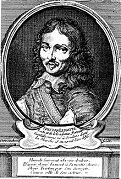
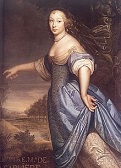
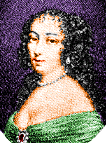

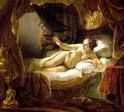
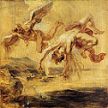

1636 On Jan. 11 the minor hassle Battle of Haselunne (Haselünne) between the Swedish and Hapsburg armies sees field marshal Baron Dodo zu Innhausen und Knyphausen (b. 1583) get KIA. On Mar. 20 Axel Oxenstierna of Sweden scores a brilliant coup when he negotiates the Treaty of Wismar with France (signed in Wismar and Mecklenburg), gaining French aid against the Hapsburgs without major concessions on his part, with the France to attack on the left bank of the Rhine River and the Swedes in Silesia and Bohemia. On Mar. 26 Utrecht U. in the Netherlands is founded; the motto is "Sol lustitiae Illustra Nos" (Sun of Justice, shine upon us) (Malachi 4:2). In Mar. London bishop (1633-49) William Juxon becomes lord high treasurer (until May 1641) and first lord of the admiralty - no problemo with church-state separation in Merry Olde England? On May 30 Upper and Lower Lausitz are ceded, and Saxony becomes Ferdinand II's ally; the Spanish under Prince Octavio Piccolomini attack N France from the Netherlands in July, and are stopped at Liege by the French army, which dissolves; a 60K-man imperial (Austrian-Spanish-Bavarian) army under Matthias Gallas enters France through Burgundy and is stopped 50 mi. from Paris at St. Jean de Losne (Saint-Jean-de-Losne) on Aug. 8, and recalled; England is officially at war with Spain, but hasn't committed any troops in almost 10 years; Bernhard, duke of Saxe Weimar is forced to retreat across the Rhine, leaving S and C Germany exposed to Hapsburg attack, leading to the fall of Augsburg and other towns along the Rhine River near the Swiss border to HRE Ferdinand II's armies. On May 31 King Iskandar Muda of Indonesia dies, and is succeeded next year by his son Iskandar (Iskander) II (until 1641). Three whole towns walk out of Mass. over the right of self-government? In June after elitist Gov. Winthrop fails to mellow out and broaden the voter base, and English-born Puritan minister Thomas Hooker (1586-1647) tells him, "I must confess, I ever looked at it as a way which leads to tyranny and so to confusion, and must plainly profess, if it was in my liberty, I should choose neither to live, nor leave my posterity, under such a government", he leads his 100-person Newtown (Cambridge) congregation along with congregations from Watertown and Dorchester (800 total) on a trek W along the Great Road, moving into the Connecticut River towns of Wethersfield, Conn., Windsor, Conn., and Hartford, Conn. by next May; a 4th group from Roxbury led by William Pynchon founds Springfield, Conn. on the N side of Enfield Falls at a point which forces all N river trade through the new town, which becomes the first settlement in Mass. for non-religious reasons; the original name is Agawam Plantation; they found it on land purchased on both sides of the Connecticut River from 18 aborigines living in a palisade fort on modern-day Longhill St., paying 18 fathoms of wampum, 18 hoes, 18 coats, 18 hatches, and 18 knives. On July 4 after being granted Rhode Island by Narragansett chief Canonicus (1565-1647), London-born Puritan Roger Williams (1603-83) and his Narragansett Indian followers found the town of Providence, R.I. at the head of Narragansett Bay as a refuge for religious dissidents, and proclaim complete religious freedom - as long as you aren't an atheist? On Sept. 24 (Oct. 4 Old Style) the Swedes under field marshal Johan Baner (Banér) (1596-1641) stunningly outwit and defeat the combined imperial-Saxon army at the Battle of Wittstock, and turn the tide of the war, after which poor Saxony is ravaged by Protestants instead of Roman Catholics, leaving little worth looting; on Dec. 22 ailing HRE Ferdinand II has his son Archduke Ferdinand elected HRE Ferdinand III (1608-57) (until 1657). On Oct. 4 after Edward Winslow returns and is elected gov. for the 2nd time, the Plymouth Colony drafts its first law - how laudable? Take me to the river, drop me in the water? By this year the following offenses are capital crimes in the Mass. Bay Colony, the Puritan paradise: adultery, assault, blasphemy, idolatry, man-stealing, murder, perjury in a capital trial, rape (incl. statutory), rebellion, sodomy, witchcraft; other colonies later add arson, counterfeiting, horse theft, piracy, robbery, and slave rebellion. On Oct. 28 Cambridge (later Harvard) College is established by vote of the Great and General Court of the Mass. Bay Colony on the banks of the Charles River, with Nathaniel Eaton as pres. #1, becoming the first Protestant (Christian) higher ed. institution in the U.S.; a tall stockade keeps out wolves and Indians; motto "Christo et Ecclesiae" (For Christ and Church), later changed to "Veritas" (Truth). On Nov. 17 ex-African slave Henrique Dias (1605-62) wins a V against the Dutch in Brazil. Sir Henry Vane the Younger (1613-62) is elected to a single term as gov. of Mass. Bay Colony (until 1637). French Jesuit (since 1624) (St.) Isaac Jogues (1607-46) goes to Canada as missionary to the Huron people, moving on to the Tobacco Nation in 1639 and the Algonquins in 1641. The mucky clear new Ching Dynasty in China is their last? The Manchu clan Aisin Gioro ("Gold Clan") under Abahai of the Later Jin (Chin. "Gold") Dynasty (founded 1616) proclaim the Qing (Ch'ing) (Xing) (Chin. "clear, pellucid") Dynasty in NE China (Manchuria) at Mukden (ends 1911), going on to capture Peking in 1644 and take over the rest of China by 1683; after Emperor Tai Zong demands that Korea accept vassal status and Injo says stuff it, the Manchus invade and make Korea a vassal state; the Ming Dynasty is now in full cookie crumble mode, and the Qins consolidate their position and attack S of the Great Wall when in the mood and the weather permits? The Dutch settle in Ceylon. The Dutch claim the island of Aruba off the coast of Venezuela. The site of Brooklyn in New Amsterdam is first settled by the Dutch and Walloons along Gowanus, Jamaica, and Wallabout Bays this year and next. Brainy Henry Adams settles in Braintree, Mass. and plants his tree. A wall is built around Veracruz, Mexico. Glasgow, Scotland becomes a free royal burgh. Archbishop William Laud prepares the Laudian Code of Statutes for Oxford U., which are adopted until 1854. According to police commissioner Delamarre, tea is introduced in Paris. Nonfiction: Tommaso Campanella (1568-1639), Atheismus Triumphatus. Sir John Hayward (1560-1627), Certain Yeres of Queen Elizabeth's Raigne (posth.); flatters the bitch even though she had him imprisoned? Peter Heylyn, The History of the Sabbath. Marin Mersenne (1588-1648), Harmonie Universelle; describes contemporary musical instruments. George Sandys (1578-1644), A Paraphrase Upon the Psalmes. Music: Heinrich Schutz (1585-1672), Kleine Geistliche Concerten (motets). Art: Sir Anthony van Dyck (1599-1641), Charles I From Three Angles; Portrait of Charles I. Nicolas Poussin (1594-1665), The Rape of the Sabine Women (1636-7). Rembrandt van Rijn (1606-69), Portrait of an 83-y.-o. Woman; The Blinding of Samson; Danae. Peter Paul Rubens (1577-1640), The Massacre of the Innocents II (1636-8); The Fall of Icarus. Diego Velazquez (1599-1660), Prince Baltasar Carlos as a Hunter. Plays: Pierre Corneille (1606-84), L'Illusion Comique; Le Cid (Arabic "The Lord") (Jan.) (Theatre du Marais, Paris); based on a 1599 play by Guillem de Castro y Bellvis of Spain; Corneille starts out under the patronage of Cardinal Richelieu, then offends him by criticizing his writing, causing a flip-flop, and the cardinal's Academie Francise criticize it to please Richelieu, although it is a popular success; Marie Madeleine de Vignerot du Pont de Courlay, Duchesse d'Aiguillon (1604-75), daughter of the cardinal's sister Francoise du Plessis becomes his patron instead, and he dedicates "Le Cid" to her. Sir William Davenant (1606-68), The Triumphs of the Prince D'Amour. Tristan l'Hermite (1601-55), Marianne (first play); his masterpiece? Philip Massinger (1583-1640), The Bashful Lover (tragicomedy). Poetry: Abraham Cowley (1618-67), Poetical Blossoms. Births: Dutch naturalist and Dutch East India Co. gov. of Dutch Malabar (1669-76) Hendrik Adriaan van Rheede tot Drakenstein (d. 1691) on Apr. 13 in Amsterdam. German duke of Brunswick-Luneburg (1635-87) Ferdinand Albert (Albrecht) (d. 1687) on May 22 in Brunswick; 3rd son of Duke Augustus the Younger (1579-1666); brother of Anthony Ulrich (1633-1714) and Rudolph Augustus (1627-1704). French painter Charles de La Fosse (d. 1716) on June 15 in Paris; pupil of Charles Le Brun. English Orientalist writer Thomas Hyde (d. 1703) on June 29 in Billingsley (near Bridgnorth), Shropshire; educated at Eton College, King's College, Cambridge U., and Queen's College, Oxford U.; coins the word "dualism" in 1700. Italian composer Pietro Sammartini (d. 1701) on Sept. 18. English merchant-slave trader Edward Colston (d. 1721) on Nov. 2 in Bristol. Bavarian Wittelsbach elector (1651-79) Ferdinand Maria (d. 1679) on Oct. 31 in Munich; eldest son of Maximilian I and 2nd wife Maria Anna of Austria (daughter of HRE Ferdinand II); husband of Henriette Adelaide of Savoy (1636-76); father of Maximilian II Emanuel (1662-1726). French poet-critic-historian ("the Lawgiver of Parnassus") Nicolas Boileau-Despreaux (Boileau-Despréaux) (d. 1711) on Nov. 1 in Paris; educated at the College de Beauvais, and the Sorbonne; establishes the principles of French classic lit. English "Centuries of Meditations" Anglican metaphysical poet-divine Thomas Traherne (d. 1674) (b. 1637?) in Hereford. English "The Vanity of Dogmatizing" clergyman-philosopher Joseph Glanvill (d. 1680). Dutch Baroque painter Melchior d'Hondecoeter (d. 1695) in Utrecht; nephew of Jan Baptist Weenix; likes to paint exotic birds. British N.Y. Province gov. #12 (1698-1701) Richard Coote, 1st Earl of Bellomont (Bellamont) (d. 1701) in Ireland. French musician-dancer-choreographer Pierre Beauchamp (d. 1705). French explorer Daniel Greysolon, Sieur Duluth (Du Lhut) (d. 1710). French explorer Pierre-Esprit Radisson (d. 1710) in Avignon (Paris?). Deaths: Flemish painter Marcus Gheeraerts the Younger (b. 1561). Italian medical professor (at Padua) Santorio Santorii (Santorio) (b. 1561). Japanese warlord Date Masamune (b. 1567) on June 27 in Sendai. German horticulturist Gervase Markham (b. 1568). English Puritan divine Rev. "Roaring John" Rogers (b. 1572) on Oct. 18. German soldier Dodo von Knyphausen (b. 1583) on Jan. 11 in Haselunne (KIA). Indonesian Aceh Darussalam sultan (1607-36) Iskanadar Muda (b. 1583) on Dec. 27.



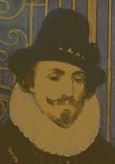









1637 On Feb. 15 HRE (since 1619) Ferdinand II (b. 1578) dies in Vienna; by June the Swedes are pressed back to the German Baltic coast. In Apr. settlers from Saugus, Mass. with permission of the Plymouth Colony found the nearby town of Sandwich, Mass. on the NW part of the hook, named after the seaport of Sandwich in Kent, England; its motto is "Post tot Naufracia Portus" (After so many shipwrecks, a haven); in 1639 it is incorporated, becoming the oldest town on Cape Cod; in 1884 the W part separates and becomes the town of Bourne. In May the English settlers of Connecticut meet to organize a self-governing colony and deal with the pesky local tribe (which has shrunk from 8K in 1621 to 1.5K from whitey's diseases) of the Pequots after they attack Wethersfield; on May 26 with help from Mass. troops commanded by Israel Stoughton they burn the chief Pequot town-fort on the Mystic River near Stonington, Conn., and massacre 400, selling the rest into slavery and ending the tribe's existence (the first major New World English-Indian clash?); they then declare a Day of Thanksgiving - the first English act of genocide? In May religious Dissenter Sir Henry Vane the Younger loses reelection as gov. of Mass. Bay Colony, and returns to England in Aug., where he becomes "America's first revolutionary". On June 30 English king Charles I's Star Chamber cruelly punishes (pillories and mutilates) pesky Puritan parliamentarian William Prynne (1600-69), along with Puritans Henry Burton (1578-1648) and physician John Bastwick (1593-1654) for pub. seditious lit. against Archbishop Laud, and decrees that there shall be just four typefaces used by pure Anglican printers. On July 23 Charles I hands over the Mass. Colony to wealthy English businessman Sir Fernando Gorges (1565-1647), one of the founders of the (Plymouth) Council of (for) New England. The first stool pigeon? On July 23 (Sun.) the new Scottish Book of Common Prayer is imposed by English king Charles I; considered crypto-Roman Catholic by Protestants, it creates social unrest and disorder in Scotland, incl. an orchestrated riot at St. Giles Cathedral in Edinburgh (John Knox's church from 1559-72), where Jenny Geddes throws a fold-up stool at Edinburgh dean James Hannay in protest, and others throw Bibles and pound on the windows; the book is never used in Scotland, but it forms the basis for the future Am. Prayer Book, and ends up costing unyielding Charles I his head. On Aug. 6 >Ben Jonson (b. 1572) dies, and Sir William Davenant (1606-68), godfather of William Shakespeare becomes poet laureate of increasingly unmerry England, becoming a supporter of Charles I and getting knighted in 1643. On Oct. 7 Victor Amadeus I (b. 1587) dies, and his wife Christine Marie (1606-63) (daughter of Henry IV of France) becomes regent for her infant son Francis Hyacinth, Duke of Savoy (1632-38) (until 1638). On Oct. 12 1,637-ton 100-gun HMS Sovereign of the Seas, built by Peter Pett is launched from Woolwick Dockyard, England, becoming the largest ship in the world. On Nov. 6-7 pregnant Anne Hutchinson is hauled before the Gen. Court chaired by Gov. John Winthrop, and quizzed on her beliefs; when she finally claims direct divine inspiration, the "woman of haughty and fierce carriage" convicts herself in their eyes of blasphemy? - I've read that before in the Gospels? On Nov. 8 after being inspired by sketches by Leonardo da Vinci, Greek man Arsenios Tselepis from Constantinople becomes the first man to fly using wings, taking off from the Galata Tower and landing in Dogancilar Square 2 mi. away; the Turks try a coverup, claiming he's a Muslim with the name Hezarfen ("expert in a thousand sciences") Ahmed Celebi. On Nov. 20 Peter Minuit sails to Delaware with Dutch and Swiss immigrants. Shiver me timbers? On Dec. 11 an uprising breaks out in Hara Castle in Shimbara, Nagasaki Prefecture, and on Dec. 17 the Japanese govt. sends 125K troops to quell the the Roman Catholic Shimbara Rebellion, Christianity is exterminated from Japan, and all foreign books and contact with Europeans are prohibited; the Kakure Kirishitan (hidden Christian) period begins, during which Japanese Christians have to go underground until 1853. The Dutch under Frederick Henry of Orange recapture Breda. Prince Rupert begins serving in the Thirty Years' War against the imperialists (until 1638). English Puritan anti-royalist MP John Hampden (1594-1643) (Oliver Cromwell's cousin) refuses to pay Charles I's "ship money", and is tried and convicted despite an eloquent defense, making Charles I's top-10 enemies list; the case establishes the principle that there can be no secret communications between lawyers and the court in legal proceedings. Grison leader George Jenatsch turns Roman Catholic in the interest of patriotism to get Austrian aid, then drives the French out of the Valtellina. Franciscan lay brother Father Domingo de Brieva and Father Andres de Toledo begin exploring the Guina Highlands N of the Amazon River and E of Rio Negro (until 1638). The town of Carlisle ("merrie Carlisle") on the W end of the border between England and Scotland S of Hadrian's Wall is granted a charter by Charles I. Veera Kerala Varma dies, and Goda Varma I (d. 1645) becomes ruler of Cochin (until 1645). Am I comparing apples to oranges, or roses to kumquats? After Tulipomania in Holland, fed by the creation of a wide variety of new bulbs causes tulip trading on the Amsterdam and Rotterdam stock markets to become subject to speculation (the Semper Augustus tulip goes for up to 6K guilders), the tulip market collapses, and the States of Holland pass a statute enforcing economic controls. The Swiss Anabaptist Persecution rages in Zurich and elsewhere. Sweden passes a law ordering all gypsies to be executed without trial. King Louis XIII becomes a snuff lover and repeals restrictions on its use; meanwhile his physician Theophraste Renaudot opens the Mont-de-Piete, the first pawnshop in Paris, and is appointed "gen. overseer of the poor" by Cardinal Richelieu, initiating free medical consultations by 1640. The first public opera house, Teatre San Cassiano (sponsored by the Tron family) opens in Vienna, causing Claudio Monteverdi to come out of retirement. Rev. Timothy Dalton (1577-1661) comes to Hampton, N.H. Russian explorers reach the Pacific coast of Siberia. The Dutch expel the Portuguese from the Gold Cast. English traders establish themselves in Canton. French traders settle at St. Louis at the mouth of the Senegal River in NW Senegal. English emigration to British North Am. is restricted by royal proclamation. Johann Valentin Andreae (Johannes Valentinus Andrea) (1586-1654) succeeds Robert Fludd as grandmaster of the Priory of Sion (until 1654) :). The first authoritatively recorded brewery in the Mass. Bay Colony is run by Capt. ? Sedgwick. Nonfiction: Rene Descartes (1596-1650), Discourse on Method (Discourse on the Method of Rightly Conducting One's Reason and Seeking Truth in the Sciences (Discours de la Methode pour bien Conduire sa Raison, et Chercher le Verite dans les Sciences); an epoch-making work expounding the technique of divide and conquer, containing the three appendices (Qui Sont des Essais de Cete Methode): La Dioptrique, advancing the corpuscular theory of light; Les Meteores: Traite de la Lumiere, on cosmology; La Geometrie, founding the field of analytic geometry and introducing the concepts of a coordinate plane and a mathematical function. Brian Duppa (ed.), Jonsonus Viribus, or The Memory of Ben Johnson Revived by the Friends of the Muses. Baltasar Gracian (1601-58), The Hero; draws a portrait of an ideal Christian leader to confute Machiavelli's Prince. Thomas Hobbes (1588-1679), A Briefe of the Art of Rhetorique. Thomas Morton of Merrymount (1576-1646), New English Canaan; lampoons the Puritans, with whom he has been in a war for years. Francis Quarles (1592-1644), Hieroglyphics of the Life of Man. Gao Ying, The True Method of Military Archery. Art: Sir Anthony van Dyck (1599-1641), James Stuart, Duke of Lennox and Richmond; Lord John Stuart and His Brother Lord Bernard Stuart; George Digby, 2nd Earl of Bristol, and William Russell, 1st Duke of Bedford. Laurent de La Hyre (1606-56), The Conversion of St. Paul. Nicolas Poussin (1594-1665), The Destruction of Jerusalem. Jusepe de Ribera (1591-1652), Pieta. Nicolas Poussin (1594-1665), The Nurture (Childhood) of Jupiter; Rape of the Sabine Women (1637-8). Sir Anthony Van Dyck (1599-1641), Children of Charles I. Jan van Goyen (1596-1656), River Scene With Castle. Rembrandt van Rijn (1606-69), Raphael Leaving Tobias. Plays: Pedro Calderon de la Barca (1600-81), El Magico Prodigioso (religious drama). Tristan l'Hermite (1601-55), Penthee (Penthée). Martin Le Roy, Polyxandre (romance). Jean Desmarets de Saint-Sorlin (1595-1676), Les Visionnaires (comedy). Georges de Scudery (1601-67), Observations sur Le Cid; causes a controversy with Pierre Corneille over his 1636 play Le Cid. James Shirley (1596-1666), A Lady of Pleasure (comedy). Joost van den Vondel (1587-1679), Gysbreght van Aemstel. Poetry: Jacob "Father" Cats (1577-1660), Trou-Ringh. John Milton (1608-74), Lycidas; pastoral elegy composed in memory of his Cambridge U. classmate Edward King, who drowned in Aug. 1637 when his ship sank in the Irish Sea off the coast of Wales; pub. in 1638 in the collection "Justa Edouardo King Naufrago". Births: Dutch naturalist Jan Jacob Swammerdam (d. 1680) on Feb. 12 in Amsterdam. Dutch Baroque painter-inventor (Mennonite) Jan van der Heyden (d. 1712) on Mar. 5 in Gorinchem. English breed mare princess Anne Hyde, Duchess of York (OE "hide" = 120 acres) (d. 1671) on Mar. 12 in Cranbourne Lodge, Windsor; daughter of Edward Hyde, earl of Clarendon (1609-74); wife of James II/VII; mother of Queen Mary II and Queen Anne. English philanthropist ("the Man of Ross") John Kyrle (d. 1724) on May 22 in Dymock, Gloucestershire; educated at Balliol College, Oxford U. French explorer-missionary (Jesuit) Father (Pere) Jacques (James) (Jim) Marquette (d. 1675) on June 1 in Laon. English bishop Thomas Ken (d. 1711) in July. French marshal Nicolas Catinat (d. 1712) on Sept. 1 in Paris. Dutch sculptor Nicolaas van der Veken (d. 1782) on Oct. 20 in Mechelen. English colonial gov. Sir Edmund Andros (d. 1714) on Dec. 6 in London; founder of William and Mary College in Va. Italian composer Bernardo Pasquini (d. 1710) on Dec. 7. French Huguenot pastor Pierre Jurieu (d. 1713) on Dec. 24 in Mer, Orleanais. Italian musician Giovanni Paolo Colonna (d. 1695) in Bologne. German-Danish organist-composer Dietrich Buxtehude (d. 1707). French vice-adm. and marshal Francois Louis de Rousselet, Marquis de Chateaurenault (Chateaurenaut) (Chateauregnaud) (d. 1716). Am. writer Mary (Rowlandson (nee White) (d. 1710) in Somersetshire, England; emigrates to Mass. in 1653. Deaths: Japanese artist Hon'ami Koetsu (b. 1558). English "Volpone" poet-playwright Ben Jonson (b. 1572) on Aug. 6 in London; "He that was only taught by himself had a fool for his master"; "Language most shows a man: Speak, that I may see thee. It springs out of the most retired and inmost parts of us, and is the image of the parent of it, the mind. No glass renders a man’s form or likeness so true as his speech. Nay, it is likened to a man; and as we consider feature and composition in a man, so words in language; in the greatness, aptness, sound structure, and harmony of it." German scientist Daniel Sennert (b. 1572); formulated the concept of the atom. English mystic-scientist Robert Fludd (b. 1574). Austrian HRE (1619-36) Ferdinand II (b. 1578) on Feb. 15 in Vienna. French astronomer Nicolas-Claude Fabri de Peiresc (b. 1580) on June 24 in Aix-en-Provence. French mathematician Pierre Vernier (b. 1580) on Sept. 14 in Ornans, Franche-Comte. Catholic hero Humilis de Bisignano (b. 1582) on Nov. 26. Italian duke of Savoy (1630-7) Victor Amadeus I (b. 1587) on Oct. 7 in Turin. English theologian, poet and religious community founder Nicholas Ferrar (b. 1592) on Dec. 1.










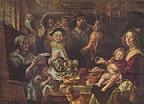
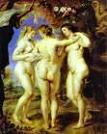
1638 There is a big earthquake in Calabria. On Jan. 3 Schouwburg Theater in Amsterdam opens. In Jan. Galileo, now totally blind from retina damage caused by peering at the Sun petitions the Holy Inquisition to be freed, but is denied; he smuggles his Dialogue Concerning Two New Sciences (Statics and Dynamics) to a publisher in Holland (the first popular science bestseller in history); John Milton makes a pilgrimage to Rome to "commune with enlightened men", and visits Galileo - enlightened, get it? In Jan. Bernhard of Saxe-Weimar (1604-39) begins a victorious campaign in the Upper Rhine, winning the Battle of Rheinfelden on Feb. 28, the Battle of Thann (Teugn-Hausen) on Apr. 19, and the Battle of Wittenweier (Aug. 8), capturing Rheinfelden, Freiburg, and Breisach (one of the strongest fortresses in Europe), respectively, and dies next year before being able to make the latter his new capital as France latches onto it; the Duke of Rohan is mortally wounded at Rheinfelden. This is our country, this is our truck, the all-new Covenantorado? On Feb. 28 the Nat. Covenant (a revival of the Nat. Covenant of 1581), written by Alexander Henderson (1583-1646) and Archibald Johnston, Lord Warriston (Wariston) (1611-63) is signed in Greyfriars Kirk in Edinburgh, with a vow added to establish Presbyterianism (church rule by elders instead of bishops) as the state religion, and denouncing all measures of the crown since 1581 to restore the episcopacy; in Nov. Charles I (their first absentee king) convenes a Gen. Assembly of the Church of Scotland in Glasgow (first in 20 years) in an effort to forestall a rev., but his attempted reforms of the Scottish Kirk, particularly the Scottish Prayer Book are rejected after he makes them decide between religion and the divine-right king (him); the assembly, packed with Supplicants ticked off by his high taxes and restraints on trade is in no mood to obey him, defies royal authority, abolishes the episcopacy, and foments a revolt, causing both sides to arm. On Mar. 7 after Rhode Island, the first Baptist colony is settled at Portsmouth, a compact for the govt. of the colony is signed; on Mar. 22 Anne Hutchinson is expelled from the Mass. Bay Colony, with gov. John Winthrop calling her an "American Jezebel", and her family and a few followers move to Aquidneck (later Rhode) Island near Portsmouth, but the arduous foot journey causes her to miscarry, letting her Mass. critics gloat about the "monstrous birth" as a punishment from God; meanwhile Sergeant Bauleton becomes mgr. of a brewhouse in Providence, R.I. On Mar. 29 Delaware is settled by Swedes and Finns led by Johan Printz, who found New Sweden (until 1655) on the Delaware River, where they build the first log cabins in America. Ft. Christina (named after Queen Christina Wasa), site of modern-day Wilmington, Del. is founded at the confluence of the Christina, Brandywine, and Delaware Rivers, becoming the first Swedish settlement in North Am. In Mar. Gov. John Winthrop signs a charter for the Ancient and Honorable Artillery Co. of Massachusetts. American democracy is born from the Bible and signed off on by God with an earthquake? On May 31 after being governed by a board of commissioners from Mass. for one year, the Conn. colonists hold a gen. court in Hartford and elect their own reps. after Rev. Thomas Hooker gives a big sermon, quoting Deut. 1:13, "Take you wise men and understanding... and I will make them rulers over you", concluding that "The foundation of authority is laid... in the free consent of the people", and that "the choice of public magistrates belongs unto the people by God's own allowance", and that they have the right "to set the bounds and limitations of the power and place unto which they call them" - thus is American-style democracy born of a Bible-thumping Puritan with a ho's name? In May long-tressed Scottish nobleman James Hamilton, 3rd Marquess of Hamilton (1606-49), who is related to James II's daughter Princess Mary and became the heir presumptive to the Scottish throne between the death of James I and the birth of Charles II, and who had proved an inept general in an expedition to Germany in 1631, where his 6K-man was wiped out, after which in 1634 Charles I appointed him I'm-a-fool-to-do-your-dirty-work-oh-yeah adviser on Scottish affairs, is appointed commissioner for Scotland to appease the Prayer Book discontents, soon coming back and claiming that they're "possessed by the devil"; on Sept. 17 he is sent back again with concessions, and fails again after a Nov. 21-28 assembly in Glasgow Cathedral won't budge, causing Charles I to decide on using force. On June 1 the first earthquake in North Am. is recorded at Plymouth, Mass. In July English secy. of state (since June 1632) Sir Francis Windebank urges Charles I to make war with the Scots. On Sept. 4 English colonist Arthur Peach is tried in Plymouth Colony for robbing and killing an Indian returning from a trading expedition to Boston, and despite a strong white lobby against killing a white over an Indian, and others noting that "he was a Mr. Winslow's man" for having worked for Edward Winslow (1595-1655), he is found guilty and hanged along with his three indentured servants Thomas Jackson, Richard Stinnings, and Daniel Cross. On Sept. 14 clergyman John Harvard (b. 1607) of Charlestown, Mass. dies, leaving his 400-book library to the new local college at Cambridge, which is later renamed in his honor; the college burns to the ground in 1674, along with all but one of his books; in 1884 a Statue of John Harvard, 1636 Founder of Harvard College is cast by Daniel Chester French, later becoming known as the "Statue of the Three Lies" because it uses a 19th cent. model, JH didn't actually found Harvard, and it was founded in 1636 not 1638; students rub the statue's left toe for luck. On Oct. 4 infant duke of Savoy (since 1637) Francis Hyacinth (b. 1632) dies, and his younger brother Charles Emmanuel II (1634-75) becomes duke of Savoy (until 1675), with his mother Marie Christine of France (1606-63) (sister of Louis XIII) continuing as regent; too bad, brothers Cardinal Maurice and Tommaso of Savoy get Spanish support and claim the throne, and Marie Christine gets French support, starting the Piedmontese (Franco-Spanish) Civil War (ends 1642) between the principisti and the madamisti. On Oct. 17 after invading Westphalia the French Protestant alliance meets the imperial forces of Gen. Hatzfeld at the Battle of Vlotho; Prince Rupert is captured and imprisoned in Linz, Austria, using the time to study military textbooks, then getting paroled in 1641 on condition of never fighting the HRE again. On Dec. 24 the Ottomans under Murad IV recapture Baghdad from the Safavid Persians after laying siege and slaughtering 60K; Iraq goes Ottoman, under nominal Turkish suzerainty (until WWI); the Ottomans then recapture Constantinople. Bernhard of Saxe-Weimar takes Freiburg, defeats the duke of Lorraine at Sennheim, and conquers Breisach. After support by Archbishop William Laud and Thomas Wentworth, new admiral (since 1636) Algernon Percy, 10th Earl of Northumberland, 4th Baron Percy (1602-68) becomes lord high admiral of England, which has been vacant since the 1628 assassination of the 1st duke of Buckingham, with the understanding that it will go to Charles I's son James when he reaches the age of majority; too bad, the English Civil Wars cause him to be removed by Parliament in 1642. The alliance between France and Sweden is renewed for three years. The Elector of Brandenburg moves his capital to Konigsberg. The Mughals capture the Afghan city of Kandahar (Qandahar) from Persia (until 1648). Willem Kieft (1597-1640) becomes dir.-gen. of New Netherland (until 1647), forming the Council of Twelve Men on Aug. 29, 1641, the first representative body in New Netheland, going on to ignore their advice inflame relations with the Lenape Indians, A group of English Puritans from Mass. settle New Haven, Conn. at New Haven Bay on Long Island Sound, intending to establish themselves in commerce, but end up being reduced to hardscrabble farming, becoming the most rigorously Puritan self-governing (charterless) settlement of all. The Laud Commission orders Mass. to return its charter and answer charges that its officials have violated its provisions; plans by New England Gov.-Gen. Ferdinando Gorges to use force to subdue the Puritans are stopped by the English Civil War. The pop. of Strawberry Banke, N.H. forms a covenant pledging allegiance to Charles I. Belize Town in the Bay of Honduras is founded by shipwrecked English pirate Peter Wallace et al., going on to become a site for Jewish immigration and export of red dyewood and mahogany wood. Ft. Coromantin, the first English fort in Africa opens for biz; the word Coromantin comes to mean slaves. Reunion Island (discovered 1513) is taken by the French. Newtown, Mass. is renamed Cambridge in honor of the univ. town in England. Mail delivery begins in Ireland. John Amos Comenius is invited by the Swedish govt. to assist in educational reforms. Torture is abolished in England. John Tradescant the Younger (1608-62) takes over his deceased father's job as head gardner for Charles I. Reformer patriarch of Constantinople Cyril Lucaris is strangled by orders of Murad IV while in Ottoman custody on trumped-up sedition charges; 1.5K copies of the Maximus trans. of the Bible into vernacular Greek are printed anyway. The Dutch gain control of the cinnamon trade in Sri Lanka from King Rajasinghe II. Use and distribution of tobacco is made a capital offense in China. The Ancient and Honorable Artillery Co. of Mass. (formed last year) is chartered as an honor guard for the gov. of Mass., and is housed in Faneuil Hall in Boston, Mass. Architecture: The Church of San Carlo alle Quattro Fontane in Rome is begun by Francesco Borromini (finished in 1646). The Myles Standish (Old) Burying Ground (Cemetery) in Duxbury, Mass., becoming the oldest maintained cemetery in the U.S.; residents incl. Mayflower Capt. Myles Standish, John Alden, and Priscilla Alden. The Sanno Shinto Shrine in Nagasaki, Japan is founded. Inventions: English astronomer-mathematician William Gascoigne (1612-44) invents the Micrometer. Science: French atty. and math dabbler ("Father of Number Theory") Pierre de Fermat (1607-65) conjectures Fermat's Last Theorem (that the Pythagorean Theorem for n greater than 2 is not solvable in integers) in the margin of his copy of Diophantus' Arithmetica, with the famous soundbyte that he "discovered a truly remarkable proof which this margin is too small to contain", launching a massive search for the proof after the Royal Academy of Sciences at Gottingen offers a 100K mark prize to prove it true or false, without takers; Fermat proves it for n=4, Leonhard Euler proves it for n=3, Peter Gustav Lejeune Dirichlet proves it for n=5 and n=14; in 1954 an electronic calculating machine proves it true for n less than 2000; it is finally solved in 1994 by English mathematician Sir Andrew John Wiles (1953-) after seven years locked up by himself, who also proves that all rational semistable elliptic curves are modular. English geometry prof. John Greaves (1602-52) measures the pyramids, and complains about finding soot in the Great Pyramid. Nonfiction: William Chillingworth (1602-44), The Religion of Protestants a Safe Way to Salvation; argues for the Bible as the sole authority in religion, and originates the quip about theologians debating how many angels can sit on a "needle's point". Galileo Galilei (1564-1642), Discorse e Dimonstrazioni Matematiche. Niccolo Sabbatini (1574-1654), Practica di Fabbricare Scene e Machine ne'Teatri. Bishop John Wilkins (1614-72), The Discovery of a World in the Moone; 2nd ed. pub. in 1640 contains the soundbyte: "I do seriously, and upon good grounds, affirm it possible to make a flying chariot." Music: Claudio Monteverdi (1567-1643), Eighth Book of Madrigals. Art: Sir Anthony van Dyck (1599-1641), Lords John and Bernard Stuart. Jacob Jordaens (1593-1678), As the Old Sang, So the Young Pipe (1638-40); The King Drinks (1638-40). Nicolas Poussin (1594-1665), Les Bergers d'Arcadie (The Shepherds of Arcadia); shepherds gather around a large tomb with the inscription "Et in Arcadia Ego" (Lat. "And in Arcadia I") (anagram of I Tego Arcana Dei, "Begone I conceal the secrets of God"); in 1656 Poussin is visited in Rome by Abbe Louis Fouquet, who writes to his brother Nicolas Fouquet, suptd. of Louis IV's finances that he told him about "certain things... so difficult to discover that nothing now on this earth can prove of better fortune nor be their equal", after which Nicolas Fouquet is arrested and imprisoned for life (becoming the Man in the Iron Mask?), and Louis XIV confiscates all his letters and inspects them personally, then purchases the painting and keeps it in his private apts. at Versailles, after which it ends up in the Louvre; in the 1970s the tomb is located outside the village of Arques 6 mi. from Rennes-le-Chateau and 3 mi. from the Chateau of Blanchefort. Rembrandt van Rijn (1606-69), The Stone Bridge; Portrait of Willem Bartolsz Ruyter. Sir Peter Paul Rubens (1577-1640), The Three Graces II; the ultimate example of Rubinesque women? Plays: Sir William Davenant (1606-68) and Inigo Jones (1573-1652), Luminalia, or The Festival of Light (masque); The Unfortunate Lovers (tragedy); The Fair Favourite (tragicomedy). John Ford (1586-1640), Thomas Dekker and William Rowley, The Witch of Edmonton; about Elizabeth Sawyer, executed on Apr. 21, 1621. John Ford (1586-1640), The Ladies Trial. Sir John Suckling (1609-42), Aglaura; The Goblins. Joost van den Vondel (1587-1679), Gijsbrecht van Amstel (historical drama). Novels: Frances Godwin (1562-1633), The Man in the Moone: or A Discourse of a Voyage Thither by Domingo Gonsales, the Speedy Messenger (posth.); first known science fiction (sci-fi) work - the origin of Speedy Gonzales? Births: Japanese emperor #111 (1655-63) Go-Sai (Nagahito) (d. 1685) on Jan. 1; 8th son of Go-Mizunoo (1596-1680). Danish scientist ("the Father of Geology and Stratigraphy") Nicolaus Steno (d. 1686) on Jan. 10 in Copenhagen; decides in 1659 to not accept anything pub. in a book but to do the experiments himself; brought up Lutheran, his own motto backfires when he studies himself into becoming a Roman Catholic? Austrian Battle of Vienna Gen. Count Ernest Rudiger (Rüdiger) von Starhemberg (d. 1701) on Jan. 12 in Graz, Styria; cousin of Guido Starhemberg (1657-1737). Dutch botanist-anatomist Fredrik Ruysch (d. 1731) on Mar. 28 in The Hague; educated at the U. of Leiden; student of Franciscus Sylvius; father of Rachel Ruysch (1664-1750); first to embalm by injecting a chemical solution into the blood vessels. French Roman Catholic Oratorian priest and Bible critic Richard Simon (d. 1712) on May 13 in Dieppe Norwegian gen. Ulrik Frederik Gyldenlove, Count of Laurvig (d. 1704) on July 20 in Bremen, Germany; illegitimate son of Frederick III of Denmark and Margrethe Pape. French Bourbon Sun king (1643-1715) ("Le Grand Monarque") Louis XIV (the Great) (Dieudonne) (d. 1715) on Sept. 5; son of Louis XIII (1601-43) and Anne of Austria, who finally has her first child after 22 years of marriage at age 37 and a prolonged public labor; his absolutism defines the rest of the cent. for Europe; has Jewish blood in him through the bloodline of the Aragons of Spain; his parents had no children for the previous 22 years of their marriage, detested each other and lived apart for 14 years, only to be reconciled by Cardinal Richelieu and then suddenly produce him, causing some to believe that the true father is one of the many illegitimate sons of Louis XIII's promiscuous father Henry of Navarre, used to produce an heir that could be controlled by Richelieu (see 1669). Swedish "Helicons Blomster" Baroque poet Lars (Lasse) Johansson (AKA Lucidor) (d. 1674) on Oct. 18 in Stockholm. English queen consort (1662-85) (Roman Catholic) Catherine of Braganza (d. 1705) on Nov. 25 in Via Vicosa, Alentejo. Scottish mathematician and scientist (inventor of the Gregorian Telescope) James Gregory (d. 1675) in Nov. in Drumoak (near Aberdeen), Aberdeenshire. Danish scientist ("Vicar Apostolic of the North") Niels (Nils) Stensen (Steensen) (AKA Steeno) (d. 1687) in Copenhagen. French ambassador and womanizer Ralph, Duke of Montagu (d. 1709). Dutch landscape painter Meindert Hobbema (d. 1709) on Oct. 31 in Amsterdam. French journalist-playwright-publicist and royal historian Jean Donneau de Vise (Visé) (d. 1710) in Paris. French philosopher Nicolas de Malebranche (d. 1715) in Paris. Deaths: Italian painter Bartolommeo Carducci (Bartolome Carducho) (b. 1560). German political philosopher Johannes Althusius (b. 1563) on Aug. 12 in Emden, East Frisia. Flemish painter Pieter Brueghel the Younger (b. 1564) in Mar.-May. English composer John Wilbye (b. 1574) in Sept. French monk Father Joseph (Francois Leclerc du Tremblay) (b. 1577) on Dec. 17; dies before being appointed cardinal; "Courage, Father Joseph, we have won Breisach" (allegedly the last words said to him by Richelieu); leaves the Latin poem Le Turciad. English naturalist-gardener John Tradescant the Elder (b. 1577) on Apr. 15-16 in Lambeth. French Protestant leader Duke Henri II of Rohan (b. 1579) on Apr. 13 in Berne; buried in Geneva. Dutch New Netherlands gov.-gen. Peter Minuit (b. 1580). Dutch Roman Catholic bishop-theologian Cornelius Jansen (b. 1585) on May 6. Dutch Flemish painter Adriaen Brouwer (b. 1605) in Jan. in Antwerp. English-born Am. clergyman John Harvard (b. 1607) on Sept. 14 in Charlestown, Mass. (TB).
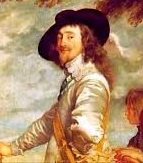

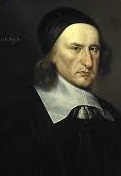

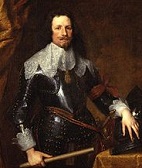
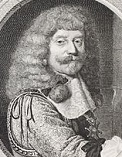
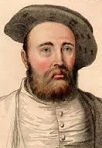

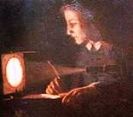


1639 If you think it's flu see a physician fast? In early Jan. the Gen. Assembly of Scotland vows to resist Charles I's attempted changes in the Scottish Kirk to the death, and votes to abolish the episcopacy and excommunicate and depose every Anglican (king-appointed) bishop in Scotland, and enforce their Puritan doctrines on their own people by force, starting the First Anglo-Scottish Bishops' War; Earl Marischal and the Marquess of Montrose lead a 9K-man Covenanter army through The Mounth in NE Scotland in the first battle of the and the Wars of the Three Kingdoms (Nations) (British Civil War) (ends 1651); after Scottish soldier Alexander Leslie, 1st Earl of Leven (1582-1661) returns from service in Sweden, where he was promoted to field marshal in 1636, the Covenanters (former Supplicants) take Edinburgh, Dumbarton, and Stirling; on May 1 an English force led by James Hamilton lands on the Firth of Forth, but after they get nowhere he is recalled in June, and is sent back to Edinburgh on July 8 by Charles I, only to be given a hostile reception and resign as Scottish commissioner; Charles I joins the army at York, but backs down before attacking, and on June 18 signs the Pacification (Treaty) of Berwick-upon-Tweed to end the war, agreeing to let a new gen. assembly and new Scottish Parliament meet in Edinburgh, agreeing to be bound by their decision; too bad, they affirm the prior assembly's decision, and go on to decree limitations on Charles' royal authority, causing him to renege, leading to a second war next year; Scottish privy councilor (since 1628) Archibald Campbell, 8th Earl and 1st Marquess of Argyll (1607-61), the head of Clan Campbell and most powerful man in Scotland (20K retainers), whose father turned Catholic and fought for Philip II but stayed Protestant himself becomes the leader of the Covenanters, getting a motion passed withdrawing the management of public affairs from the control of the crown in favor of the estates. On Jan. 15 the Fundamental Orders of Conn., the first written constitution in history and precursor of the U.S. Constitution (based on a sermon by Thomas Hooker) are adopted by reps. of three Connecticut towns; it provides for voting by English adult males whether church members or not, except the gov., who has to be a member "of some approved congregation"; Puritan theocracy is abandoned. On Jan. 24 George Jenatsch (b. 1596) is assassinated by Rudolf Planta in revenge for killing his daddy Pompejus in 1621; on Sept. 3 the Peace of Milan ends the 20-year Valtelline War (begun 1620), giving it back to the Grisons (until 1797), with save passage guaranteed to Spanish troops. In Jan. Charles I allows Va. gov. Sir Francis Wyatt (1588-1644) to call the Gen. Assembly once a year, which sets a precedent for royal colonies in North Am.; by this year Virginia has exported 750 tons of tobacco, and is chafing under Charles I's export restrictions; on Jan. 6 Va. destroys its surplus tobacco; a law is passed decreeing that "all persons except Negroes" are to get arms and ammo to fight Indians. On Jan. 23 80 New Christians are burned in an Auto da Fe in Lima, Peru along with their leader Francisco Maldonna de Silva for practicing Judaism. On Mar. 27 a Jewish riot results in Rome when a Jewish baby is forcibly baptised - he coulda been a Norman Mailer? On Apr. 14 the Swedes under Johan Baner defeat the Hapsburg imperial army under Archduke Leopold Wilhelm (1614-62) of Austria at the Battle of Chemnitz, opening the road to Bohemia; they then attack Prague on May 20 but are thrown back; the French and Swedes decide to campaign together in C Germany. On May 13 Cambridge College is officially renamed Harvard College. On May 17 Persia signs the Treaty of Zohab (Qasr-e-Shirin) (Kasri Sirin) with the Ottomans, establishing a mutual frontier and ending over a cent. of sporadic conflict; the shah accepts the final loss of Baghdad. On July 25 after abandoning his siege of French-held Turin, Italy, Victor Amadeus I's brother Thomas Frances of Savoy, Prince of Carignano (1596-1656 works with a fifth column to stage a surprise night attack on July 25 (Aug. 27?), seizing the city but not the citadel, which is held by a French force, after which regent Christine Marie of France signs a truce, which ends on Oct. 24, after which Thomas is defeated by the French under Gen. Henri de Lorraine, Count of Harcourt (1601-66) AKA Cadet la Perle, who performs the complicated Route de Quiers. On Aug. 22 Francis Day (1605-73) of the British East India Co. (which is still smarting from their boinging at Amboina in 1623) acquires a trading station in Madras (Chennai) on the Coromandel Coast of the Bay of Bengal in SE India (modern-day pop. 7M/8.9M), with permission from the local nayak Damerla Venkatapathy to build a factory and warehouse. On Sept. 25 the first printing press in North Am. is established in Cambridge, Mass. in connection with Harvard College, producing mainly religious tracts and sermons; meanwhile Mass. becomes the first state to require marriage licenses. On Sept. 25 Wampanoag Sachem Woosamequen (Massasoit) (1581-1661) and his son Mooanam come to the General Court at Plymouth and acknowledge their confederacy with the govt. of England. On Nov. 5 the first post office in the colonies opens in Mass. at the home of Richard Fairbanks. Having contracted Hooker Fever, the General Court of Mass. becomes a body of reps. from the various towns around Plymouth; the 1-page Oath of a Free-Man, printed in Cambridge, Macc. replaces the purchase of stock by membership in the Puritan church as the requirement for becoming a freeman and having voting powers, becoming the first document printed in the Am. British colonies; too bad, none of 50 copies survives. Charles I grants a renewed patent for the province of Maine to Sir Ferdinando Gorges, naming him proprietor; the name Maine is considered a compliment to Charles I's queen Henrietta Maria, who owns the French province of Mayne; after he dies in 1647 and his son neglects it, Mass. begins governing it (until 1820); early settlers are met by the Penobscot ("Penawapskewi" = rocky part or descending ledges) Indian tribe, who teach them about bean-hole bean cooking, putting a pot of beans, onions, and salt pork covered with molasses in a hole filled with ash and embers for 6 hours for yummy yum yum - followed by pee-yuuu six hours later? Boston, England-born Darby Field (1610-49) becomes the first white man to ascend the White Mountains of New Hampshire. A Dutch squadron of 11 ships, under lt. adm. Maarten Harpertszoon Tromp (1597-1653) defeats a vastly superior Spanish feet off Gravelines. The Cossacks advance over the Urals, reaching the Pacific at Okhotsk. Jules Mazarin (1602-61) enters Richelieu's service. John Milton cuts his Grand Tour of Europe short to enlist on the side of the Puritan Parliament. The Greek Orthodox Church convenes the Council of Constantinople, which condemns Calvinism. The Tokugawa shogunate of Japan begins a policy of total isolation, expelling the Portuguese with their Jesuits, and permitting only a yearly Dutch ship landing at Edo. The first immigration restriction legislation in North Am. prohibiting paupers and criminals from immigrating is passed in Mass. - each boatload tries to stop the next? The Roman Catholic monasteries in Ireland are dissolved, causing the Book of Kells to be surrendered to the English crown, after which the English govt. of Dublin gains possession of it by 1653. The Jesuit Order reaches its 100th birthday, going from under 1K members at Loyola's death in 1556 to over 15K, while busily spreading the Roman Catholic faith in America from the Great Lakes to Paraguay, and from Africa to Asia? Shah Jahan erects the walled city of Old Delhi (the Red Fort) (Shahjahanabad), becoming the 6th Delhi city. Newport, R.I. (modern-day pop. 25K) is founded on Aquidneck Island, becoming a main base for Baptists in 1640 and Jews in 1658, followed by more Portuguese Jews in 1745, who make the manufacture of sperm oil and candles its main industry, making the town rich; in 1663 the Colony of Rhode Island and Providence Plantations receives a royal charter, with capital at Newport, and Benedict Arnold as gov. #1; in the 19th cent. it attracts millionaires who set up summer mansions, with elaborate ballrooms and chandeliers spraying perfume; during the admins. of U.S. presidents Dwight D. Eisenhower and John F. Kennedy it hosts Summer White Houses. The city of Ulan Bator (Ulaan Baatar) (Mongolian "red hero") (original name Urga) (modern-day pop. 1.37M) in NC Mongolia on the confluence of the Tuul and Selbe Rivers is founded as a nomadic Buddhist monastic center. H.A. Hugelin founds the first bottled wine factory in France (Alsace), Hugel. English astronomer Jeremiah Horrocks (1619-41) observes the transit of Venus across the Sun's disk, confirming his own predictions. Quinine begins to be used for medicinal purposes. Drury Lane Theatre in London receives its first patent. Architecture: Louis Le Nau builds Hotel Lambert in Paris on St. Louis Island. Nonfiction: Academie Francaise, Dictionary of the French Language (1639-94). Giovanni Baglione (1566-1643), The Nine Churches of Rome. Father Jacinto Barrasa (-1704), History of the Foundation of Lima (Peru). Gerard Desargues (1593-1662), Modern Geometry. Thomas Fuller (1608-61), The Historie of the Holy Warre; the Crusades; written by a witty rector of Broadwindsor, Dorsetshire who is on the make. Galileo Galilei (1564-1642), Diagramma della Verita (Diagrams of Truth). :) William Pierce, American Almanac (Cambridge, Mass.); first Am. almanac. Music: Marco Marazzoli and Vergilio Mazzochi, Chi Soffre, Speri (Who Suffers, Waits); the first comic opera. Claudio Monteverdi (1567-1643), Adone (opera); opens at Teatro San Cassiano in Venice. Art: Nicolas Poussin (1594-1665), The Hebrews Gathering Manna. Rembrandt van Rijn (1606-69), Portrait of His Mother. Diego de Velazquez, The Buffoon of Coria (El Bobo de Coria). Francisco de Zurbaran (1598-1664), St. Francis in Meditation. Fiction: John Fletcher (1579-1625), Bloody Brother; contains The Drinking Song. Philip Massinger (1583-1640), The Unnatural Combat. Plays: William Cartwright (1611-43), The Royal Slave (drama). Pierre Corneille (1606-84), Cinna (tragedy). Sir William Davenant (1606-68), The Spanish Lovers, or The Distresses (comedy). Joost van den Vandel, Maeghden. Births: English "Phyllis is My Only Joy" dramatist-politician Sir Charles Sedley, 5th Baronet (d. 1701) in Mar. Am. Salem Witch Trials Puritan minister Increase Mather (d. 1723) on June 21 in Dorchester, Mass; son of Richard Mather (1596-1669); father of Cotton Mather (1663-1728); educated at Harvard College. English prince Henry Stewart (Stuart), Duke of Gloucester (Henry of Oatland) (d. 1660) on July 8 in Oatlands Palace, Surrey; 3rd surviving son of Charles I and Henrietta Maria. English clockmaker ("the Father of English Clockmaking") Thomas Tompion (d. 1713) on July 25 in Northill, Bedfordshire; teacher of George Graham ((1673-1751). German astronomer Gottfried Kirch (d. 1710) on Dec. 18. French "Big Three" dramatist (with Moliere and Corneille) Jean-Baptiste Racine (d. 1699) on Dec. 22 in La Ferte-Milon (Aisne); educated at the College d'Harcourt by Jansenists of the Abbey of Port Royal; reads classical Latin and Greek. Am. Wampanoag chief Metacomet (Metacom) (King Philip) (d. 1676) in R.I.; 2nd son of Massasoit (1581-1661). French winemaker Benedictine monk (blind) Dom Pierre Perignon (d. 1715) - in Champagne? Deaths: English soldier Robert Carey, 1st earl of Monmouth (b. 1560) on Apr. 12; the Memoirs of Robert Carey are pub. in 1759 (2nd ed. 1808), becoming popular for their description of the last moments of Elizabeth I and James I's reaction to the news. Italian philosopher-monk Tommaso Campanella (b. 1568) on May 21 in Paris; leaves 82 works. English diplomat Sir Henry Wotton (b. 1568) in Dec.: "An ambassador is an honest gentleman sent to lie abroad for the good of his country." Peruvian Dominican monk St. Martin de Porres (b. 1579) on Nov. 3 in Lima; canonized in 1962 by Pope John XXIII. Mexican-born Spanish dramatist Juan Ruiz de Alarcon y Mendoza (b. 1581) on Aug. 4 in Madrid. Ottoman sultan #15 (1617-8, 1622-3) Mad Mustafa I (b. 1591) on Jan. 20 in Istanbul in his cage. Swiss Grisons leader George Jenatsch (b. 1596). German poet Martin Opitz (b. 1597). German Protestant gen. Bernhard of Saxe-Weimar (b. 1604) on Aug. 16 in Neuenburg am Rhein; buried in Weimar. French royal mistress (of Louis XIV) Marquise de Maintenon (b. 1635) on Apr. 15 in Saint-Cyr-l'Ecole Home, Noisy; dies after refusing an audience to Peter the Great.